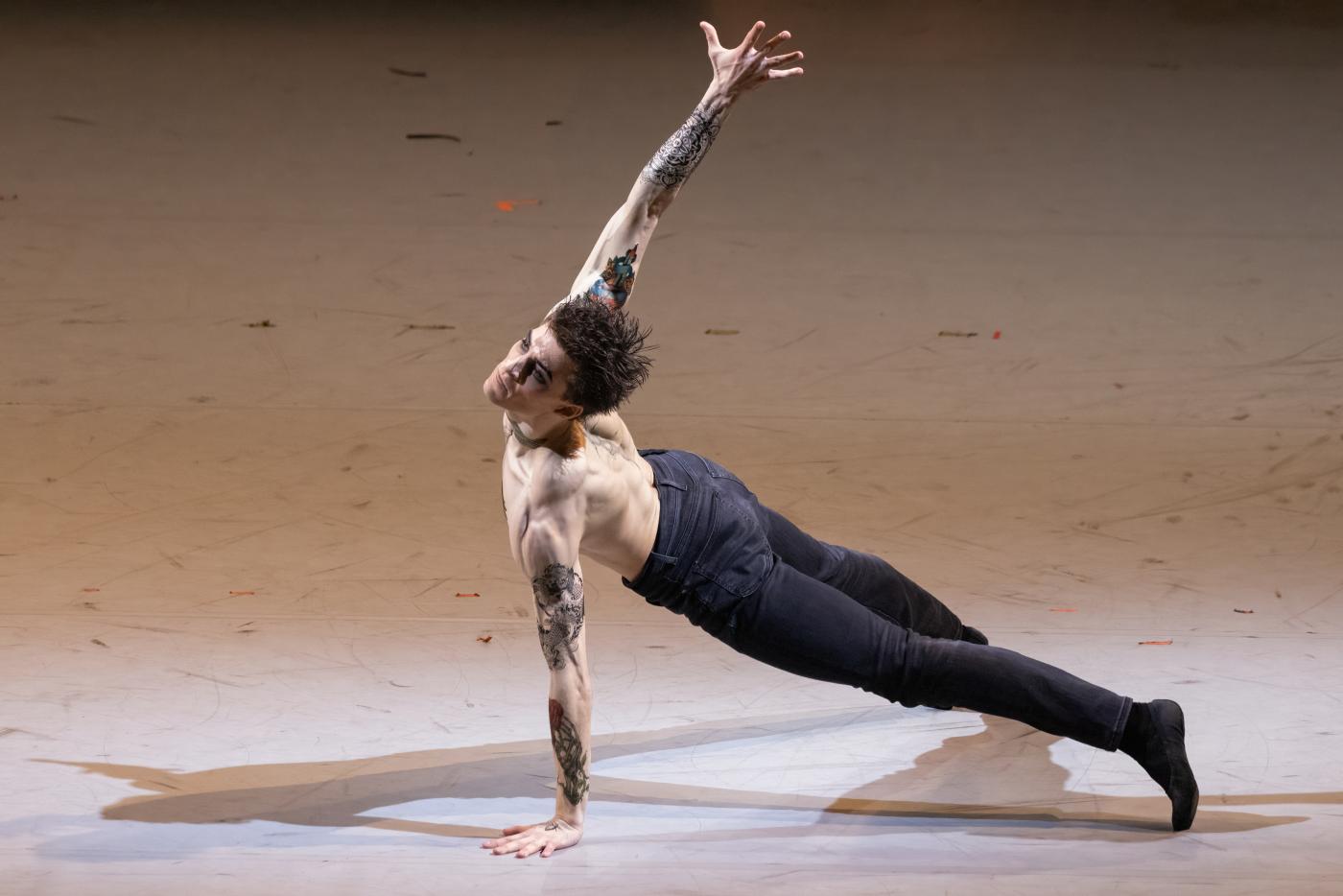“Planida” (“Russian Character”/“Nerve”/“Francesca da Rimini”)
MuzArts
Maly Theatre/Alexandrinsky Theatre
Moscow/St. Petersburg, Russia
September/November 2025 (video)
by Ilona Landgraf
Copyright © 2026 by Ilona Landgraf
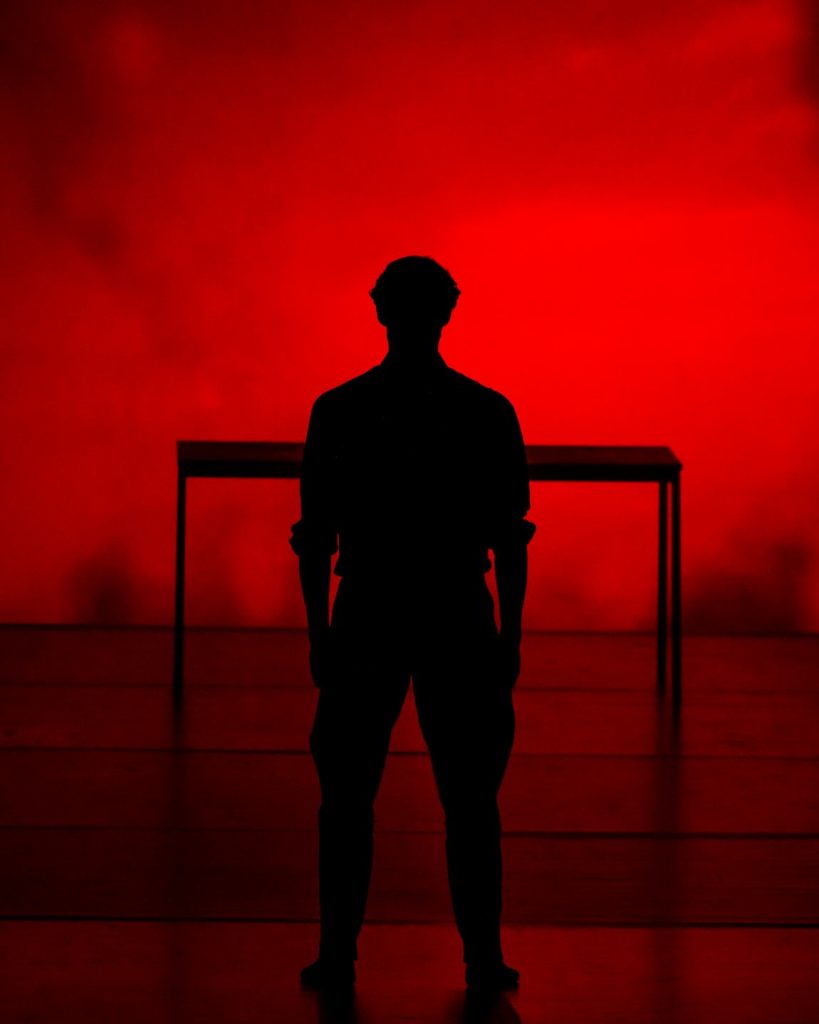
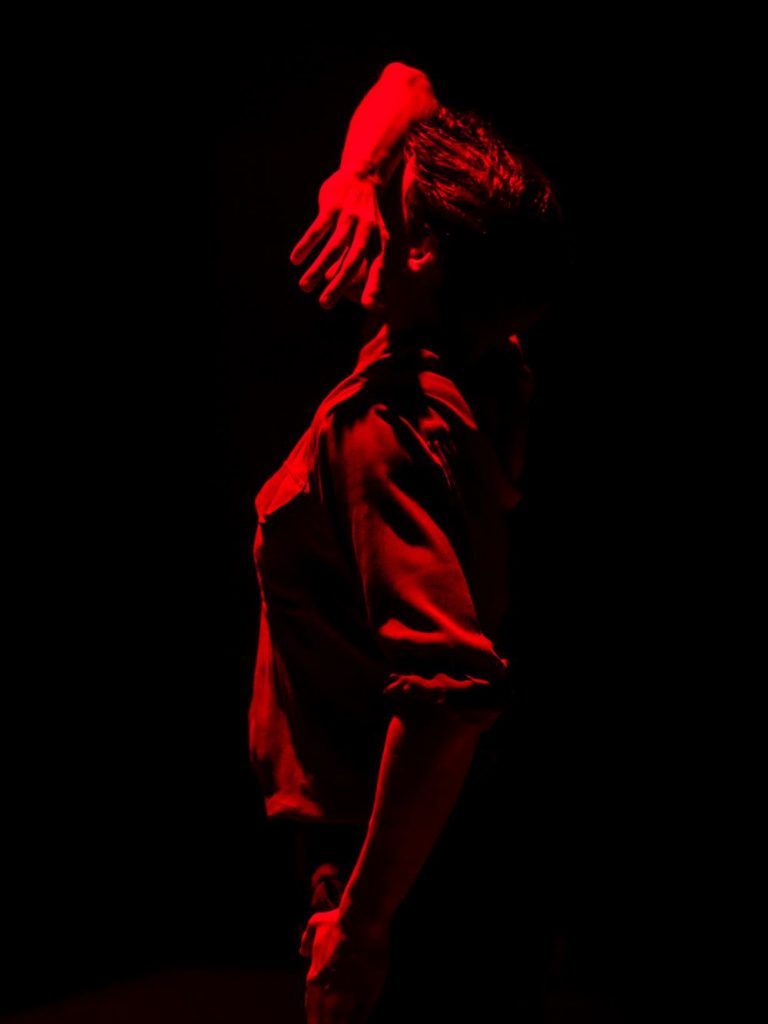 Tomorrow, MuzArts’ triple bill Planida returns to Moscow’s Maly Theatre where it premiered in September 2025. It combines two old pieces—Nerve by Anna Shchekleina and Francesca da Rimini by Yuri Possokhov—along with Russian Character, a then-new creation by Pavel Glukhov. As in previous productions, dancers of the Bolshoi Ballet will be on stage. Thanks to MuzArts’ executive producer, Daria Faezova, I was able to watch videos of the program recorded at the Maly Theatre and St. Petersburg’s Alexandrinsky Theatre.
Tomorrow, MuzArts’ triple bill Planida returns to Moscow’s Maly Theatre where it premiered in September 2025. It combines two old pieces—Nerve by Anna Shchekleina and Francesca da Rimini by Yuri Possokhov—along with Russian Character, a then-new creation by Pavel Glukhov. As in previous productions, dancers of the Bolshoi Ballet will be on stage. Thanks to MuzArts’ executive producer, Daria Faezova, I was able to watch videos of the program recorded at the Maly Theatre and St. Petersburg’s Alexandrinsky Theatre.
All three pieces deal with the concept of “Planida,” the predetermined course of life that is realized regardless of human action. Planida is roughly synonymous with fate, but while fate refers to unfolding events, Planida focuses on final results.
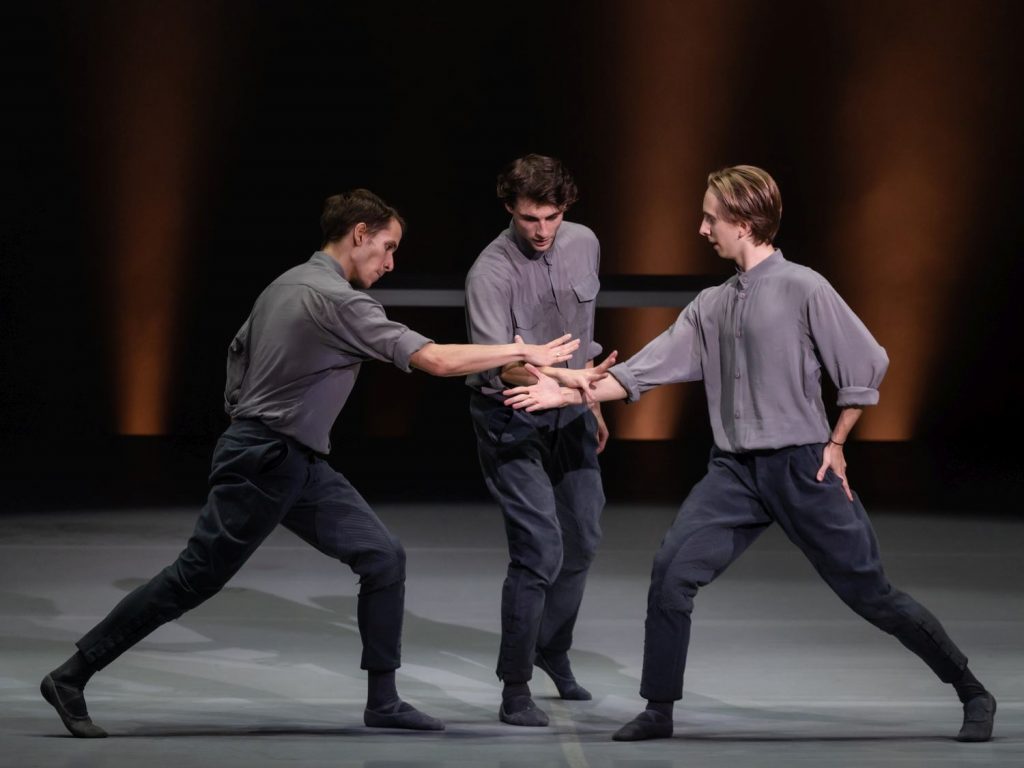
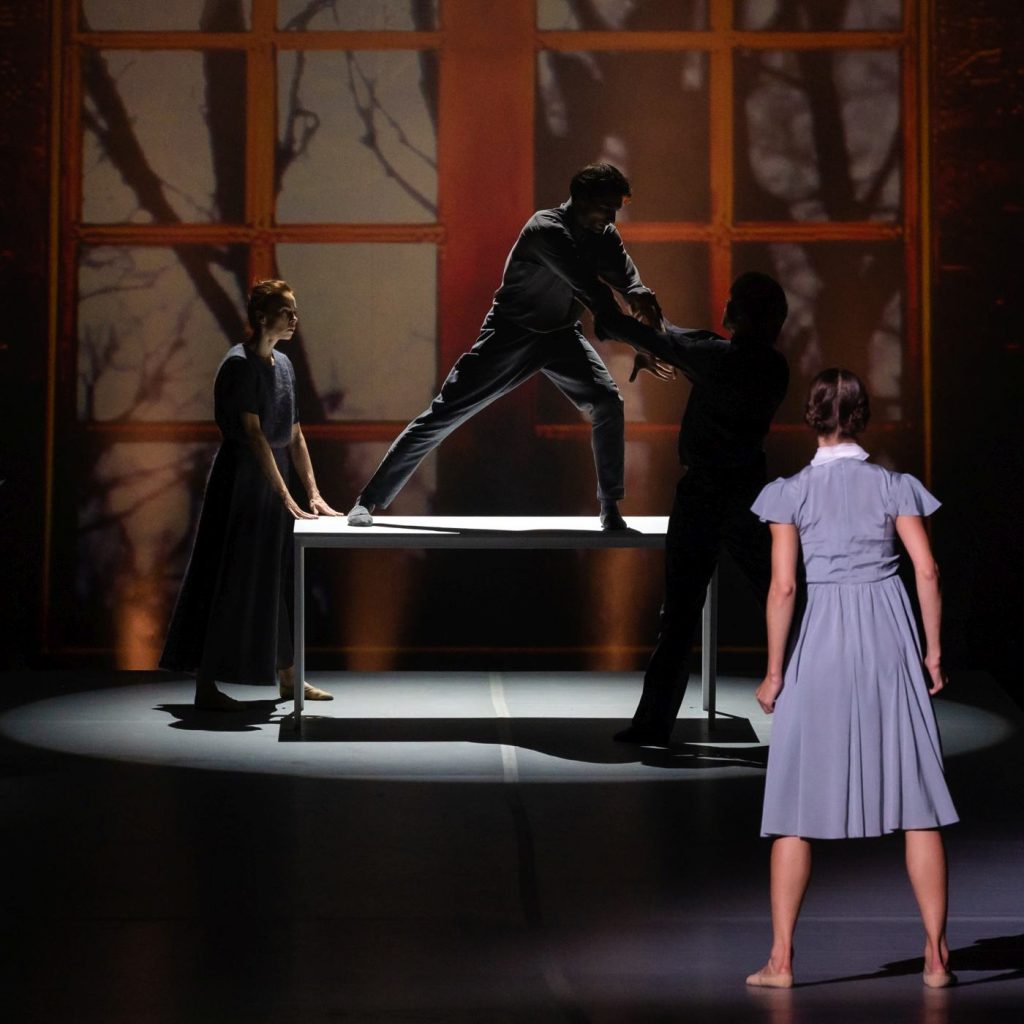 Glukhov’s Russian Character is based on Alexei Tolstoy’s eponymous war story and is dedicated to the heroism and fortitude of the Soviet people during the Great Patriotic War. It premiered last year for the eightieth anniversary of the war’s end. The hero of Tolstoy’s story is the young tanker, Yegor Dryomov, whose face was badly burnt when his tank was knocked out at the Battle of Kursk. On recovery leave at home, he visits his parents but does not dare to frighten them. Instead, he pretends to be their son’s friend. Internally, however, he hopes that they will recognize him anyway.
Glukhov’s Russian Character is based on Alexei Tolstoy’s eponymous war story and is dedicated to the heroism and fortitude of the Soviet people during the Great Patriotic War. It premiered last year for the eightieth anniversary of the war’s end. The hero of Tolstoy’s story is the young tanker, Yegor Dryomov, whose face was badly burnt when his tank was knocked out at the Battle of Kursk. On recovery leave at home, he visits his parents but does not dare to frighten them. Instead, he pretends to be their son’s friend. Internally, however, he hopes that they will recognize him anyway.
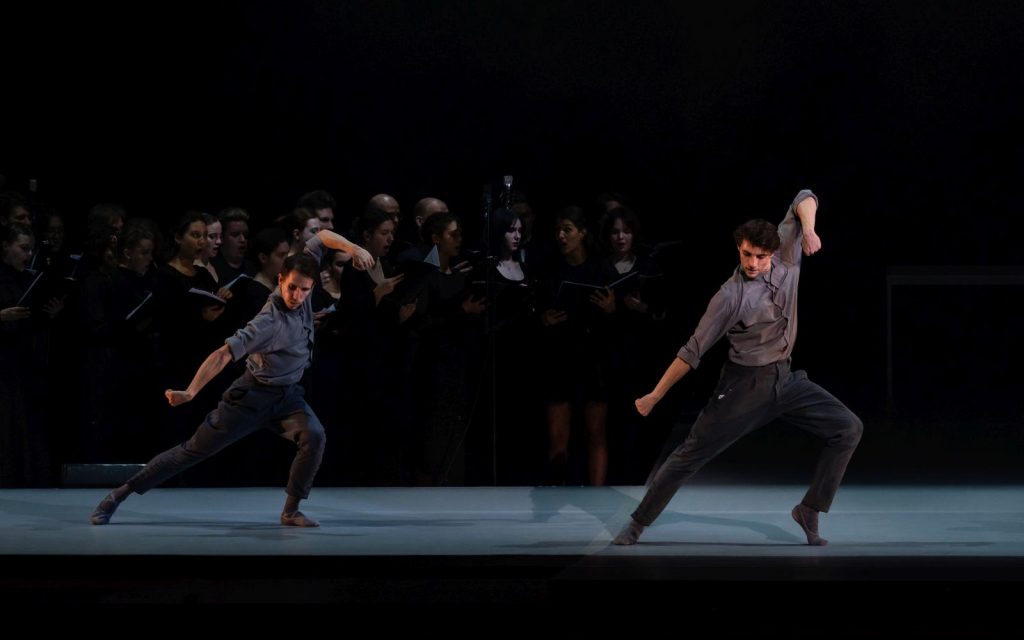
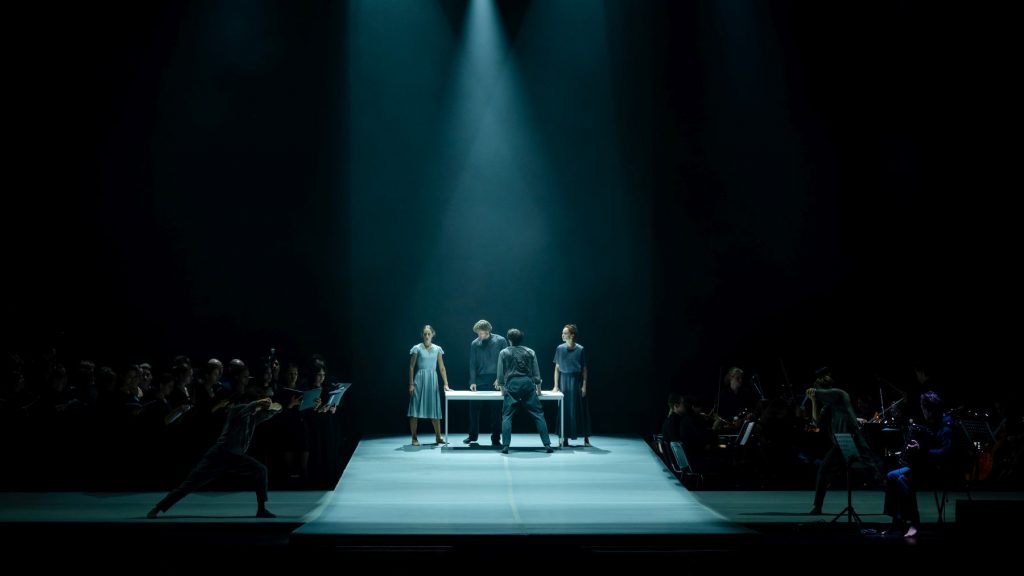 But they say nothing, though his mother senses the deception. The meeting with Yegor’s beautiful bride, Katya Malysheva, is even more painful. She not only fails to identify him but also staggers back at the sight of his disfigured face. Resolved to bury his feelings, Yegor returns to his comrades at the frontline. There, he receives a letter from his mother asking for the truth. Yegor confesses his deceit and begs for forgiveness. His mother and bride visit him later, and all ends well.
But they say nothing, though his mother senses the deception. The meeting with Yegor’s beautiful bride, Katya Malysheva, is even more painful. She not only fails to identify him but also staggers back at the sight of his disfigured face. Resolved to bury his feelings, Yegor returns to his comrades at the frontline. There, he receives a letter from his mother asking for the truth. Yegor confesses his deceit and begs for forgiveness. His mother and bride visit him later, and all ends well.
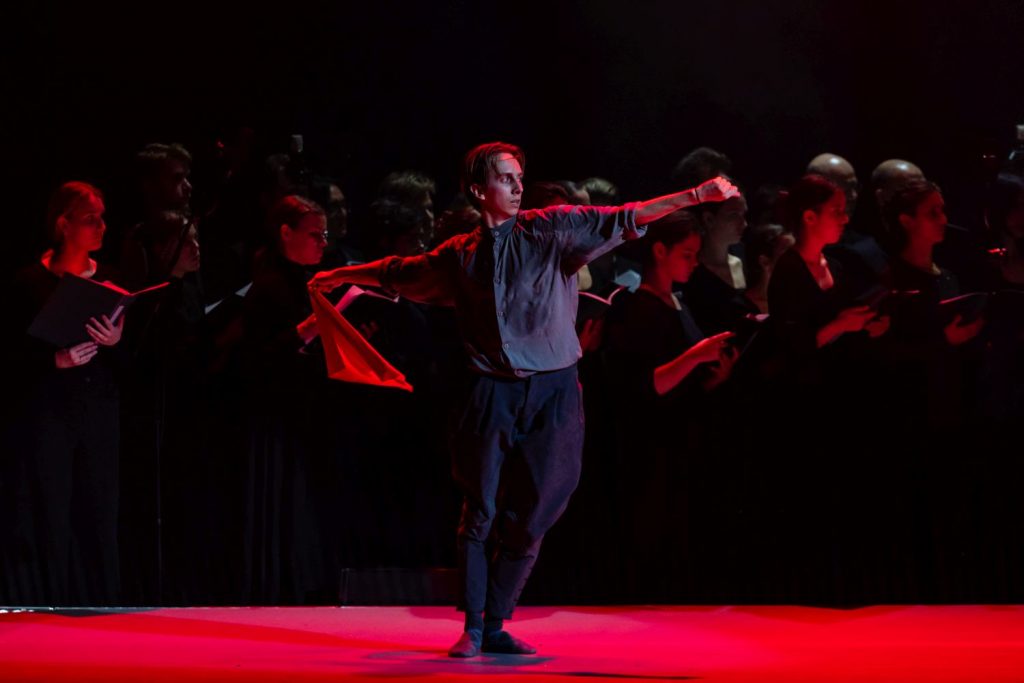
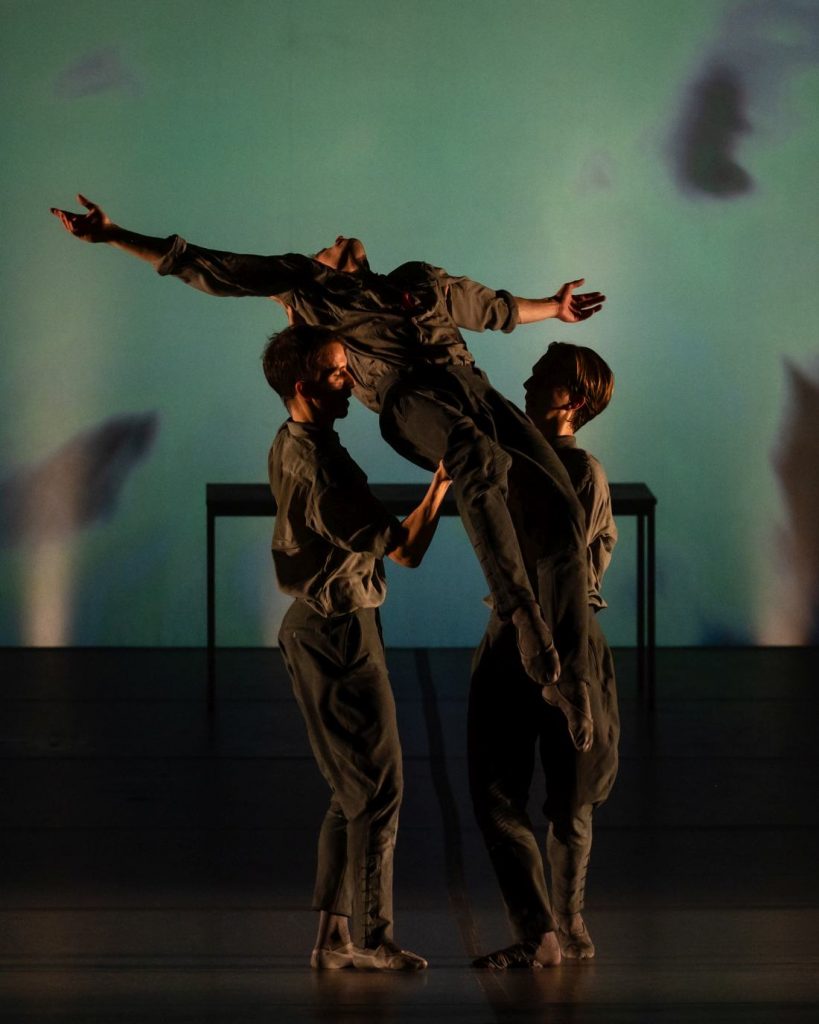 The black silhouette of Glukhov’s Yegor (Alexei Putintsev) stood motionless in the darkness, watching a huge window slide open. Behind it, a blaze roared. The simple table in front of the fire later turned out to signify his family’s home. Accompanied by grave piano music, clanging metal (played by the Moscow Youth Chamber Orchestra under the baton of Andrei Kolyasnikov from a shallow pit on the right side of the cross-shaped stage), and monotonal sacral singing (performed by the Ippolitov-Ivanov Chamber Choir of the Moscow State Pedagogical Institute, which stood in the left pit), Yegor’s elbow shielded his eyes, and then his hand rested reassuringly behind his back. His breathing eased, then his fist clenched.
The black silhouette of Glukhov’s Yegor (Alexei Putintsev) stood motionless in the darkness, watching a huge window slide open. Behind it, a blaze roared. The simple table in front of the fire later turned out to signify his family’s home. Accompanied by grave piano music, clanging metal (played by the Moscow Youth Chamber Orchestra under the baton of Andrei Kolyasnikov from a shallow pit on the right side of the cross-shaped stage), and monotonal sacral singing (performed by the Ippolitov-Ivanov Chamber Choir of the Moscow State Pedagogical Institute, which stood in the left pit), Yegor’s elbow shielded his eyes, and then his hand rested reassuringly behind his back. His breathing eased, then his fist clenched.
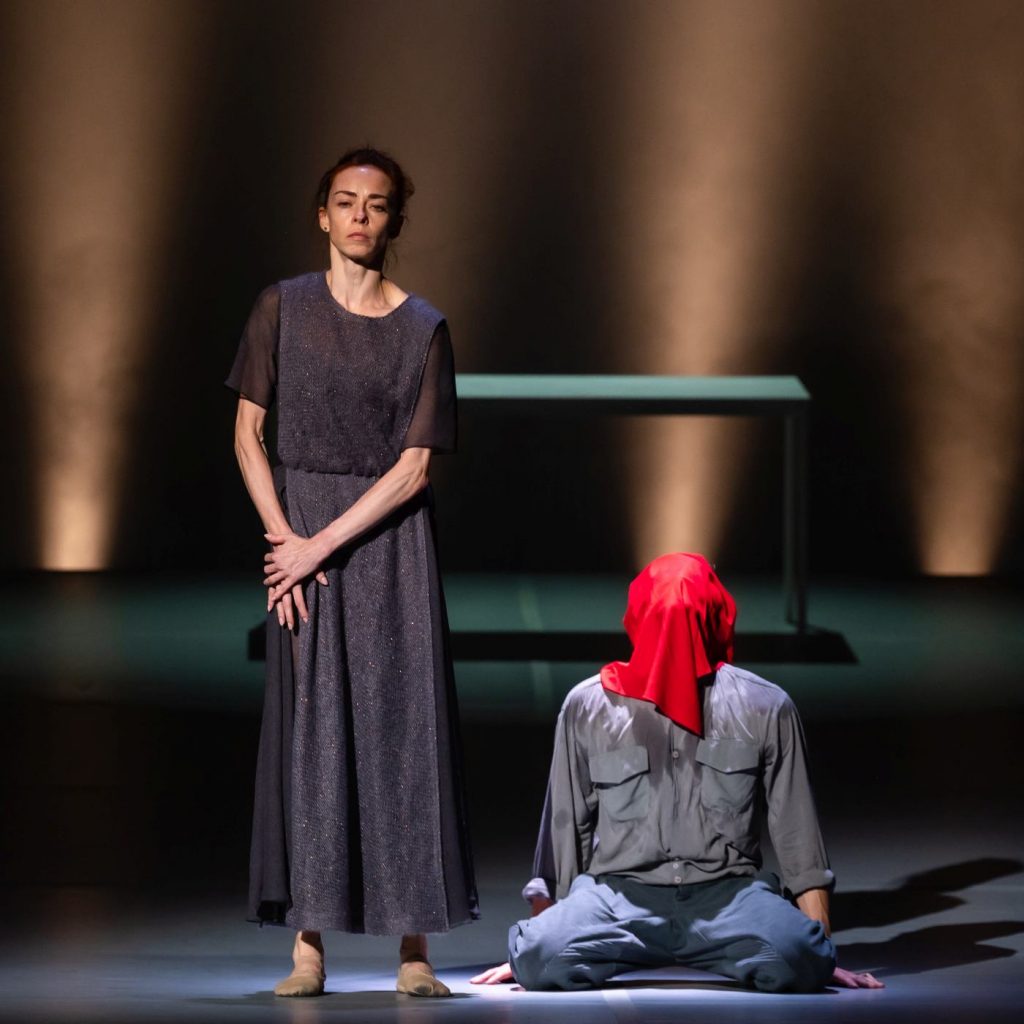
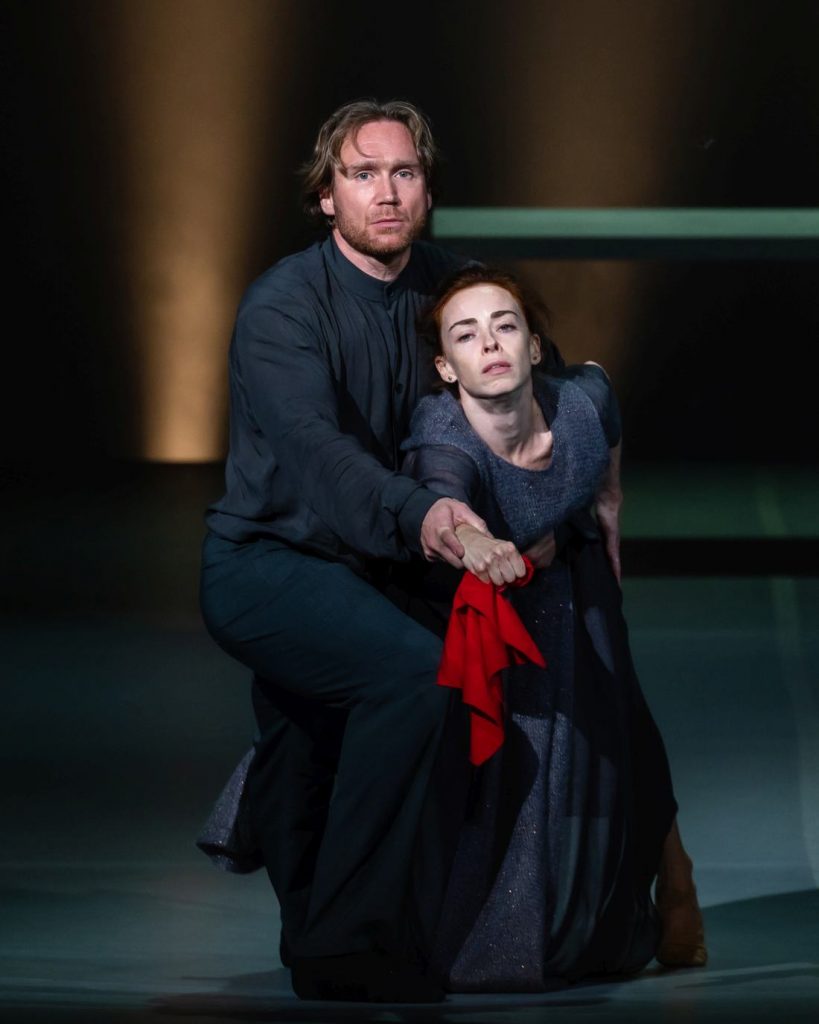
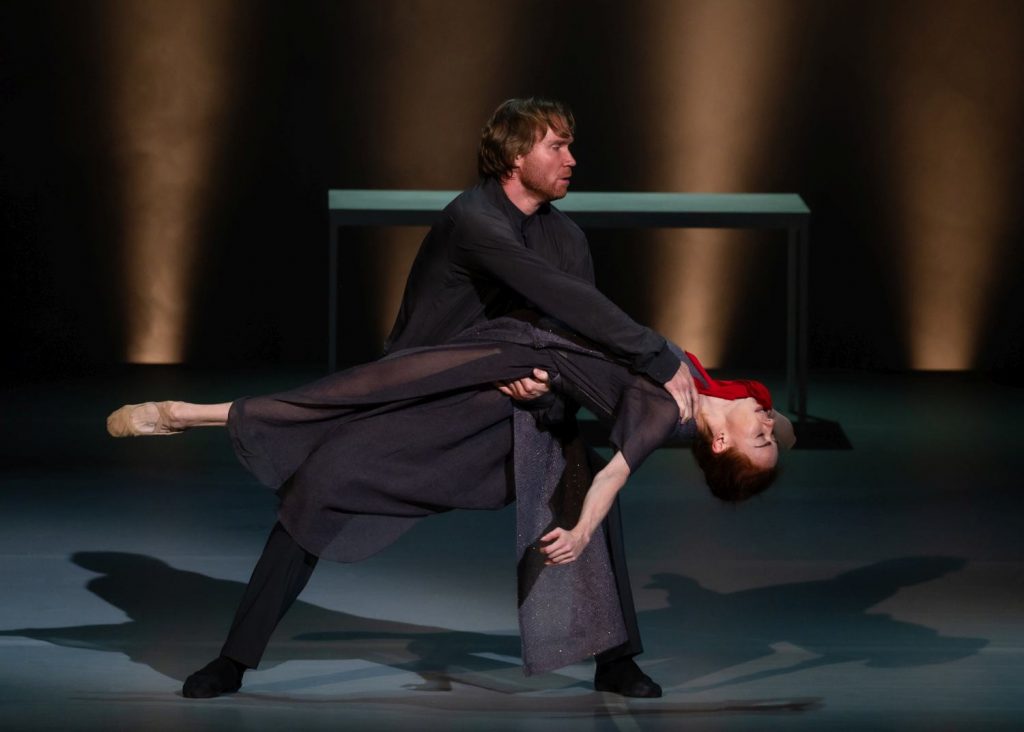 The sound of a bell put an end to the fire, leaving a gray scene that, except for white and red scarves and Katya’s (Elizaveta Kokoreva) modest red lipstick, remained gray throughout. To the first rattling sounds of an accordion (played by Aidar Gainullin—a renowned Russian musician and Honored Artist of the Republic of Tatarstan—who sat at the stage’s right front side), Yegor turned toward the audience. As if to calculate the fire range and angle of his tank’s gun, his arms stretched and bent in various angles, and his feet measured their range of motion. Finally, he gathered his courage and ran toward the table against the edges of which his parents (Ekaterina Krysanova and Mikhail Lobukhin) supported themselves.
The sound of a bell put an end to the fire, leaving a gray scene that, except for white and red scarves and Katya’s (Elizaveta Kokoreva) modest red lipstick, remained gray throughout. To the first rattling sounds of an accordion (played by Aidar Gainullin—a renowned Russian musician and Honored Artist of the Republic of Tatarstan—who sat at the stage’s right front side), Yegor turned toward the audience. As if to calculate the fire range and angle of his tank’s gun, his arms stretched and bent in various angles, and his feet measured their range of motion. Finally, he gathered his courage and ran toward the table against the edges of which his parents (Ekaterina Krysanova and Mikhail Lobukhin) supported themselves.
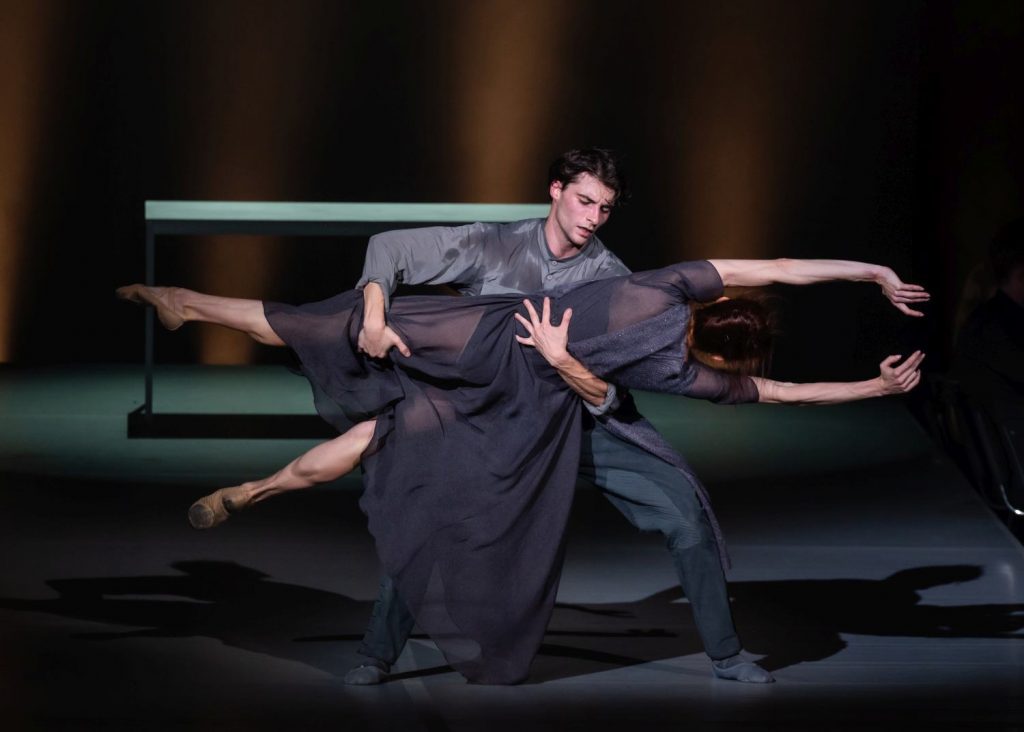
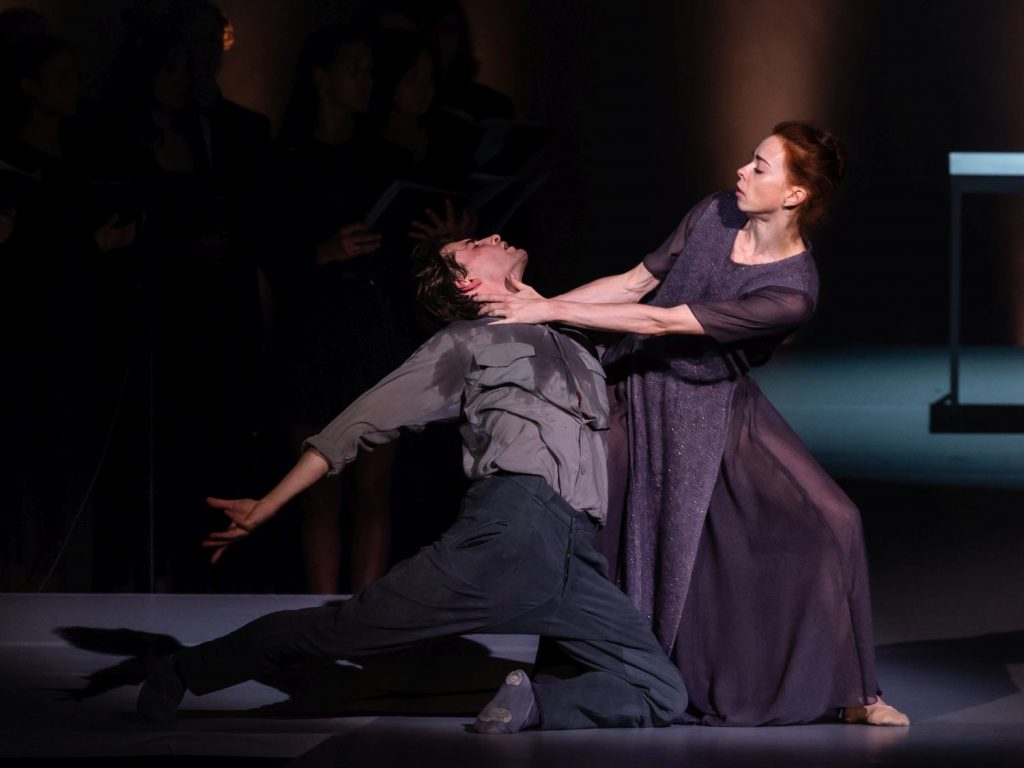
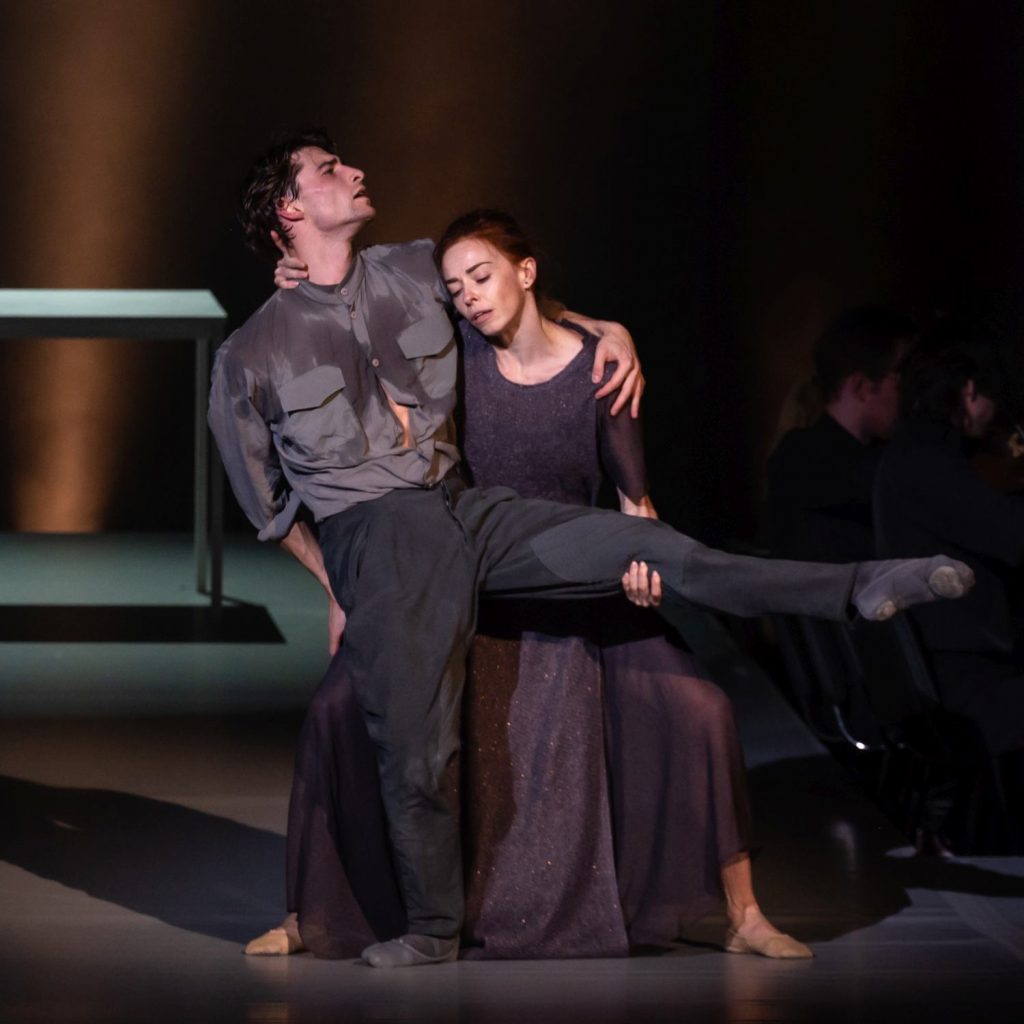 In front of a tall lattice window behind which leafless trees swayed in the wind, the family kitchen suddenly resembled a sanctuary. The encounter was like a ritual during which the three knotted themselves in complicated poses as if to avoid straightforward questions. Yegor’s true identity was almost revealed, but his head eluded the grip of his parents’ hands in the very last moment, and though he danced at length with Katya, one couldn’t read her thoughts. Pushed by the urging score, their and his parents’ synchronous pas de deux conveyed the strains of wartime relationships but didn’t relate specifically to Yegor.
In front of a tall lattice window behind which leafless trees swayed in the wind, the family kitchen suddenly resembled a sanctuary. The encounter was like a ritual during which the three knotted themselves in complicated poses as if to avoid straightforward questions. Yegor’s true identity was almost revealed, but his head eluded the grip of his parents’ hands in the very last moment, and though he danced at length with Katya, one couldn’t read her thoughts. Pushed by the urging score, their and his parents’ synchronous pas de deux conveyed the strains of wartime relationships but didn’t relate specifically to Yegor.
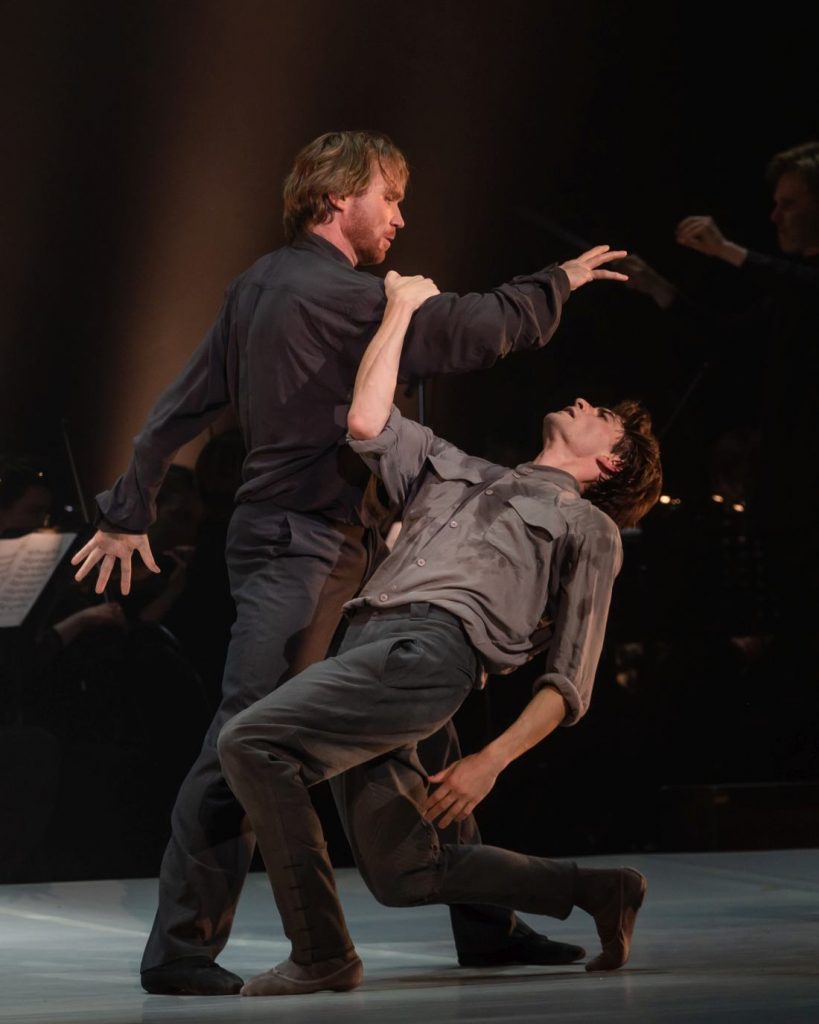
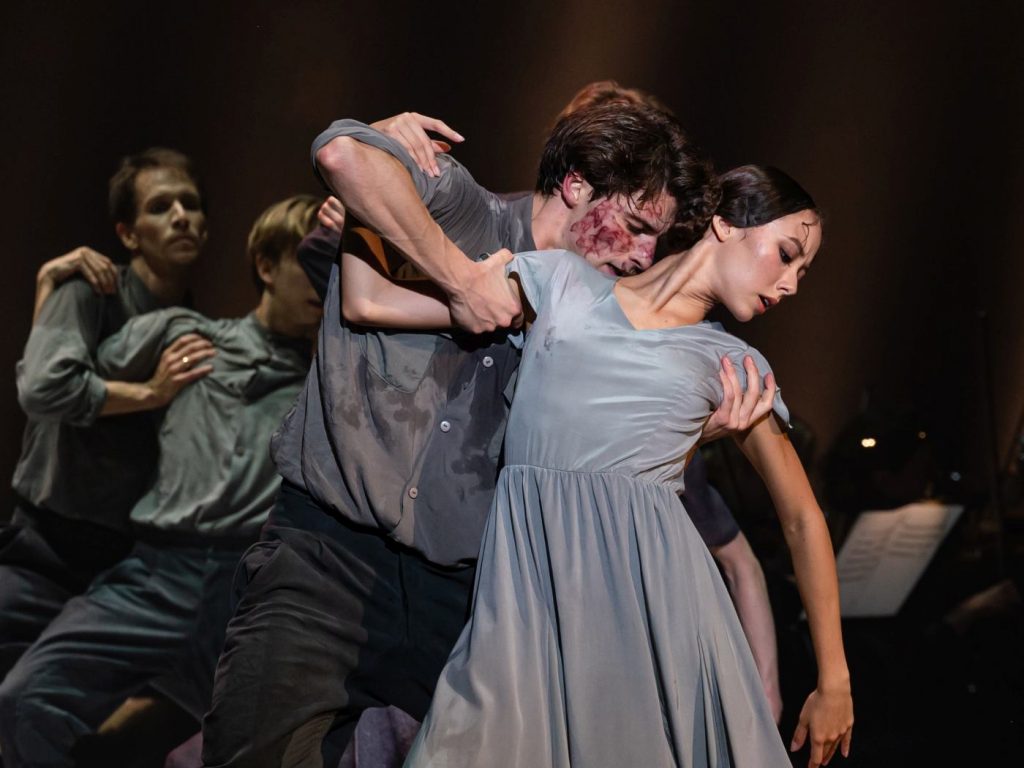 As the kitchen window briefly turned into a hell of fire again, Yegor was back with his comrades (Georgy Gusev and Ivan Sorokin), sharing a cigarette, some laid-back, off-duty time, and combat. Later, they teased Yegor with the white scarf that Katya had given him as a keepsake. It was replaced by a red one that covered Yegor’s face once his comrades had carried him off the battlefield, circled by huge ravens. When his mother’s quivering hands tore the scarf away, Yegor ran off.
As the kitchen window briefly turned into a hell of fire again, Yegor was back with his comrades (Georgy Gusev and Ivan Sorokin), sharing a cigarette, some laid-back, off-duty time, and combat. Later, they teased Yegor with the white scarf that Katya had given him as a keepsake. It was replaced by a red one that covered Yegor’s face once his comrades had carried him off the battlefield, circled by huge ravens. When his mother’s quivering hands tore the scarf away, Yegor ran off.
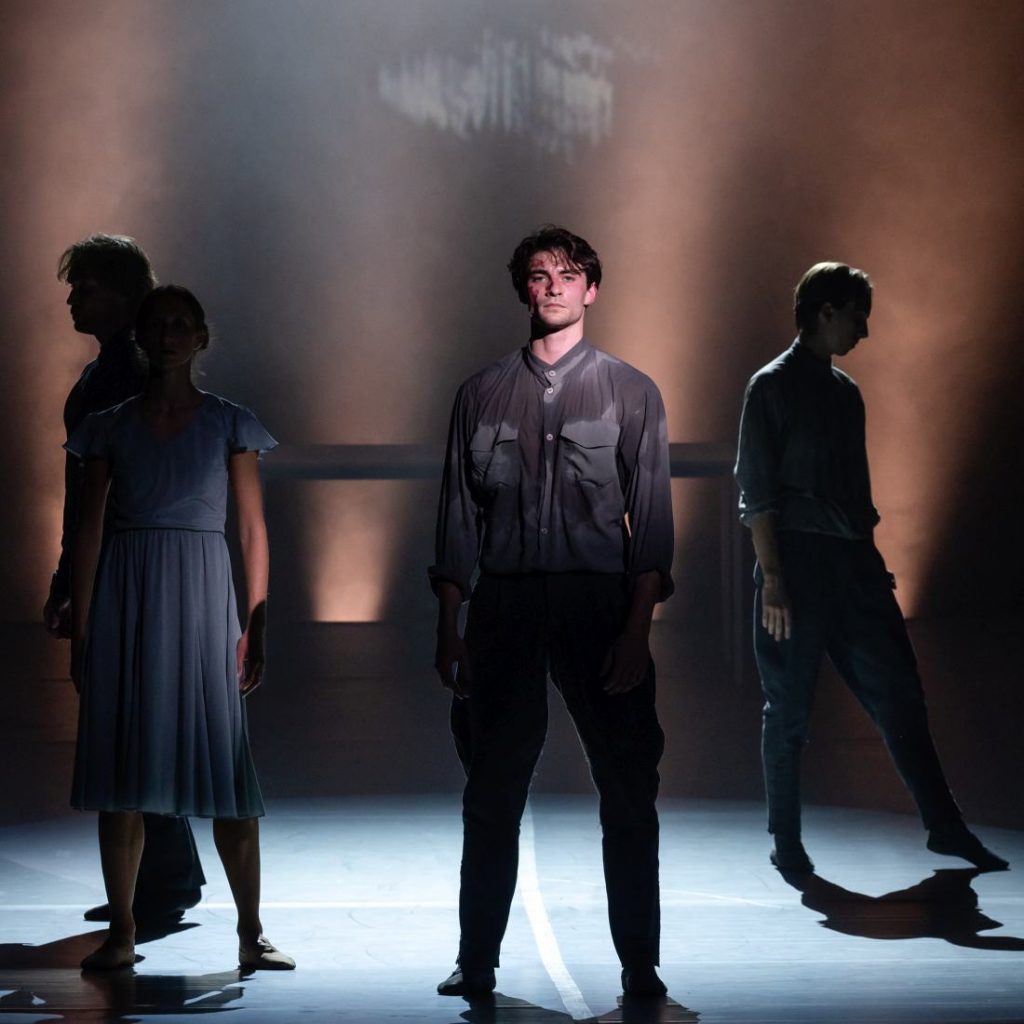
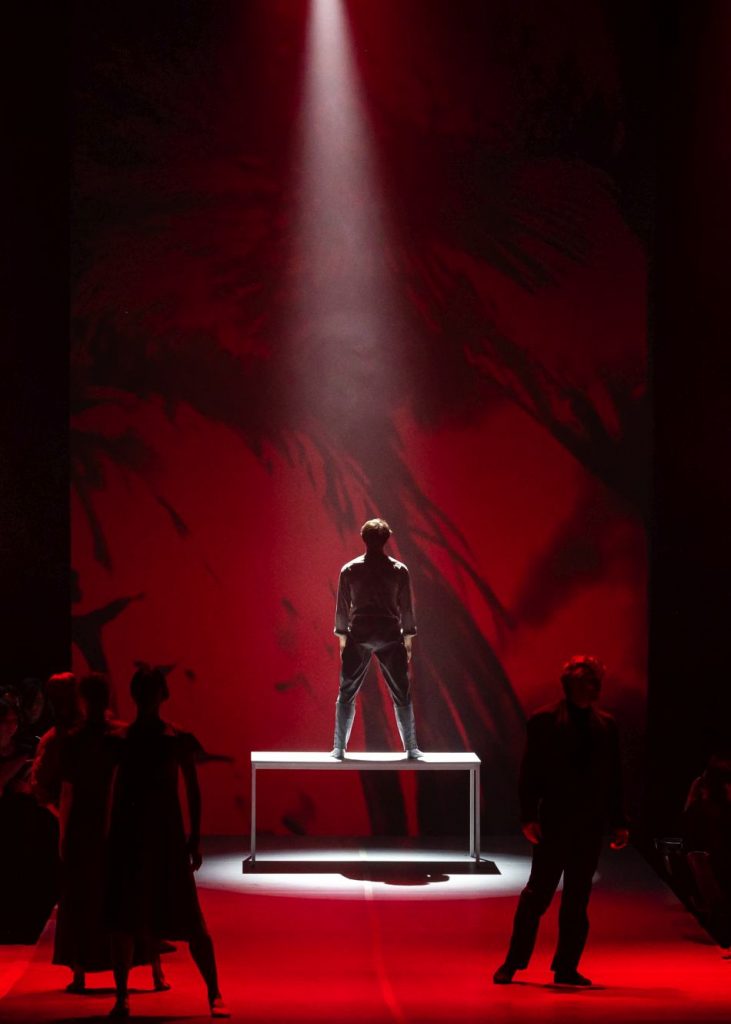 Facing reality tormented his mother and revealed the strength of his father (Krysanova and Lobukhin danced a fabulously strong pas de deux at this point). It also reminded her of the affectionate relationship she had with her young son.
Facing reality tormented his mother and revealed the strength of his father (Krysanova and Lobukhin danced a fabulously strong pas de deux at this point). It also reminded her of the affectionate relationship she had with her young son.
Only three-quarters of the way through the piece did bloody scarves disfigure Yegor’s face. His hands and arms frantically covered them, even though his father forcefully pulled them off again and again. This was his son, and he stood with him. However, Yegor needed to come to terms with his own past. He finally took his place among his family, next to Katya.
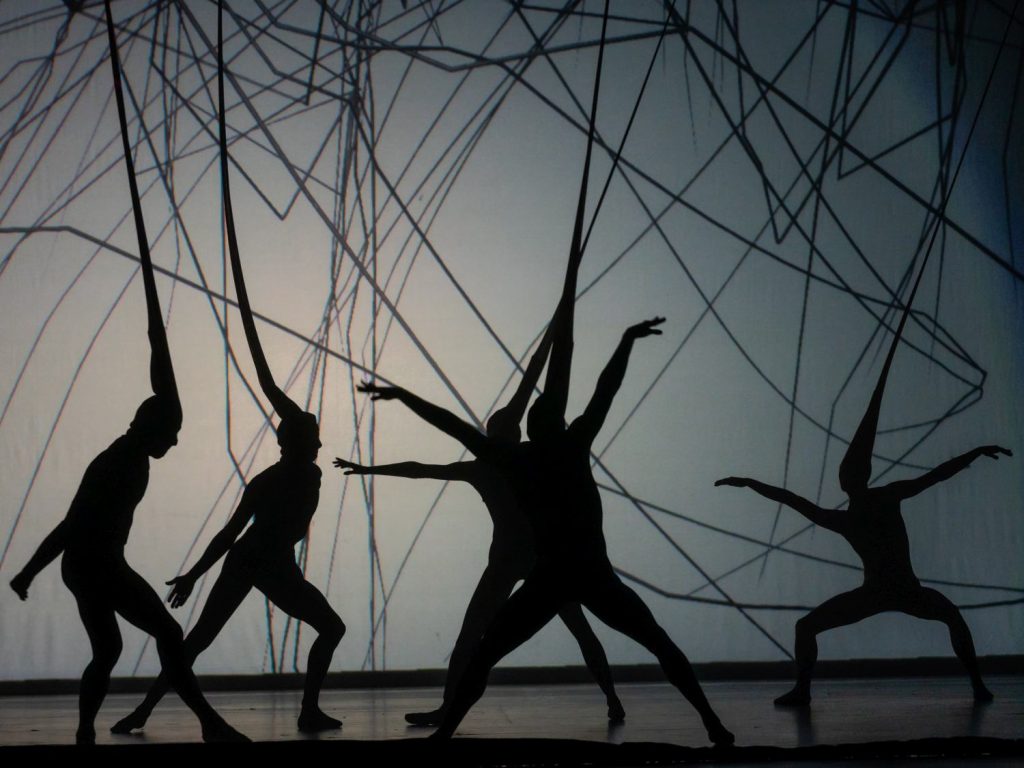
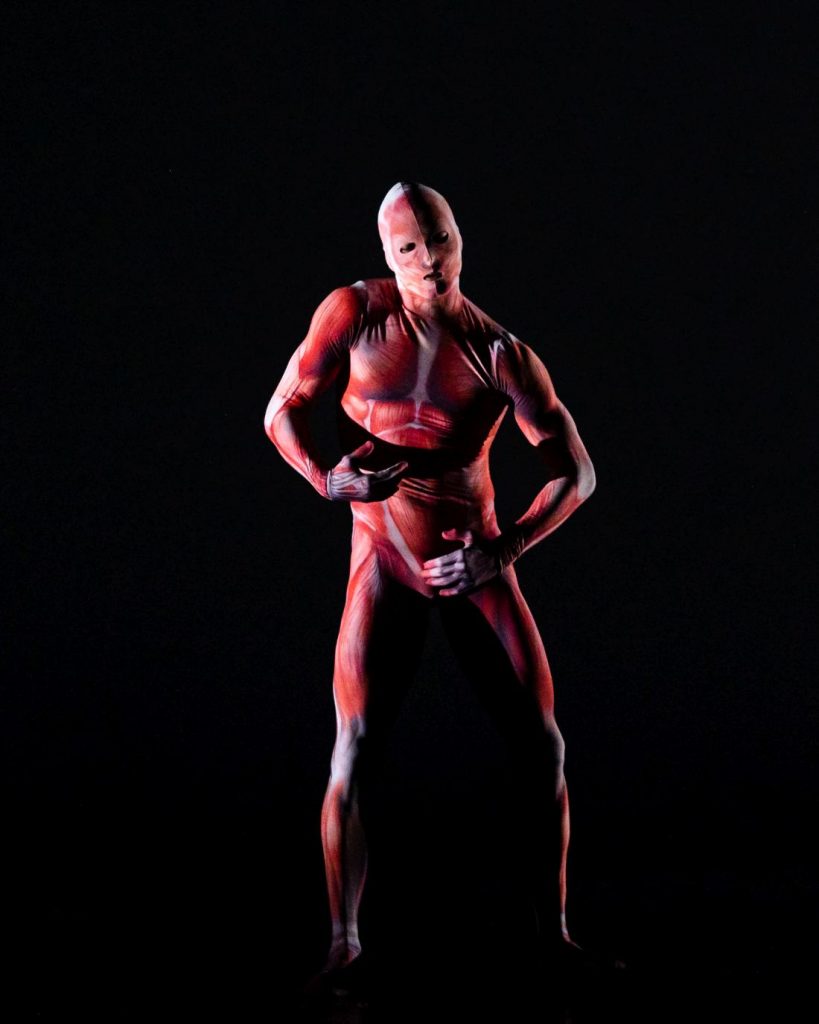
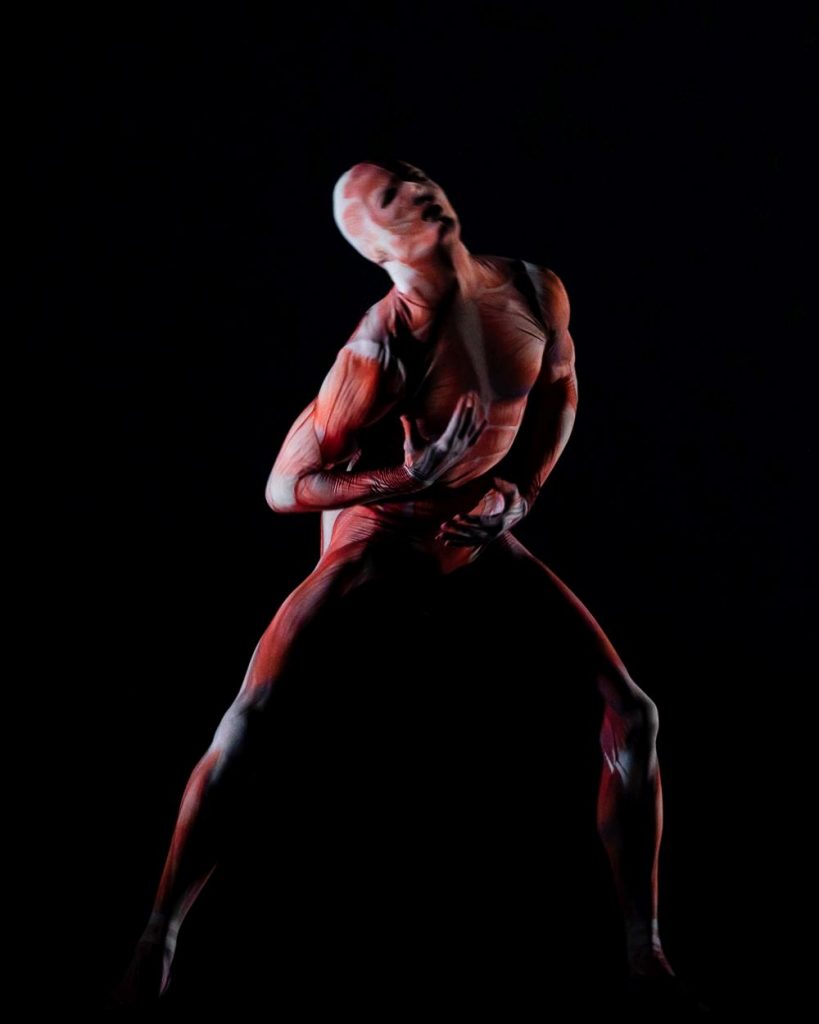 In Shchekleina’s Nerve (2022), a man’s course of life is fundamentally changed by some unknown, deeply disturbing event. Only once did the shadow of his head pass by on the backdrop, but he certainly was the owner of the brain, the gray matter of which we were permitted to peep into. It showed seven black dancer-neurons in a harmonious workflow. Rhythmic electronic pulses (music by Vasily Peshkov) induced their gentle undulations.
In Shchekleina’s Nerve (2022), a man’s course of life is fundamentally changed by some unknown, deeply disturbing event. Only once did the shadow of his head pass by on the backdrop, but he certainly was the owner of the brain, the gray matter of which we were permitted to peep into. It showed seven black dancer-neurons in a harmonious workflow. Rhythmic electronic pulses (music by Vasily Peshkov) induced their gentle undulations.
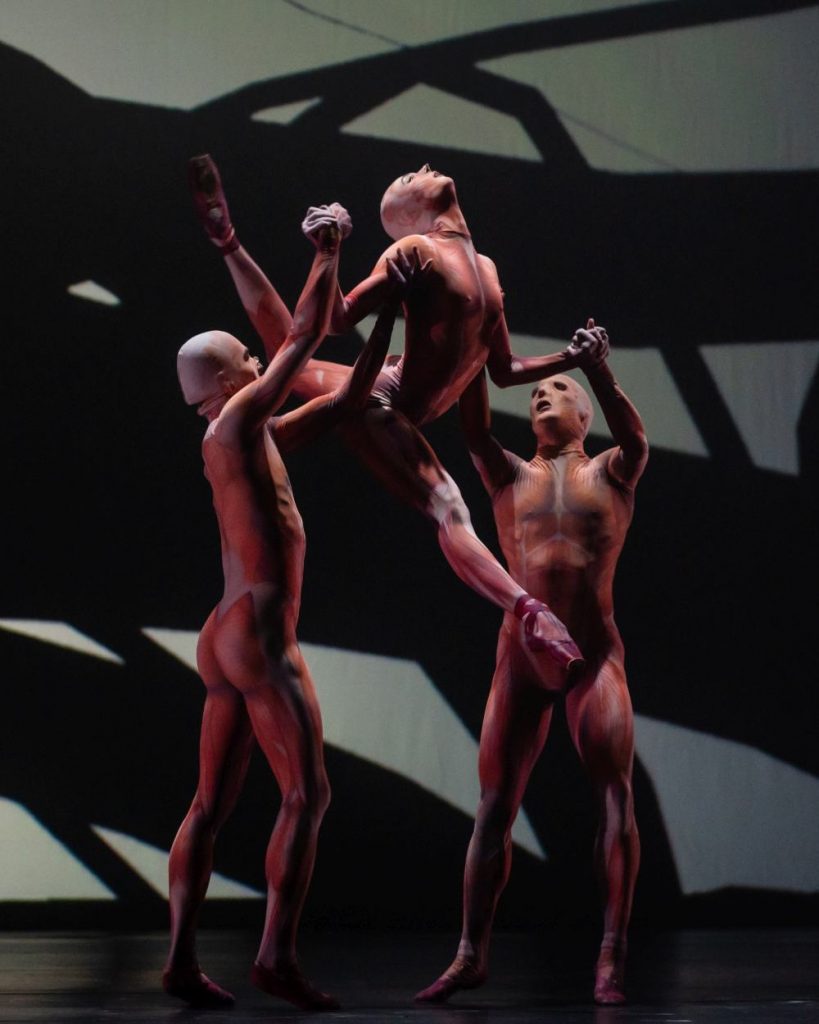
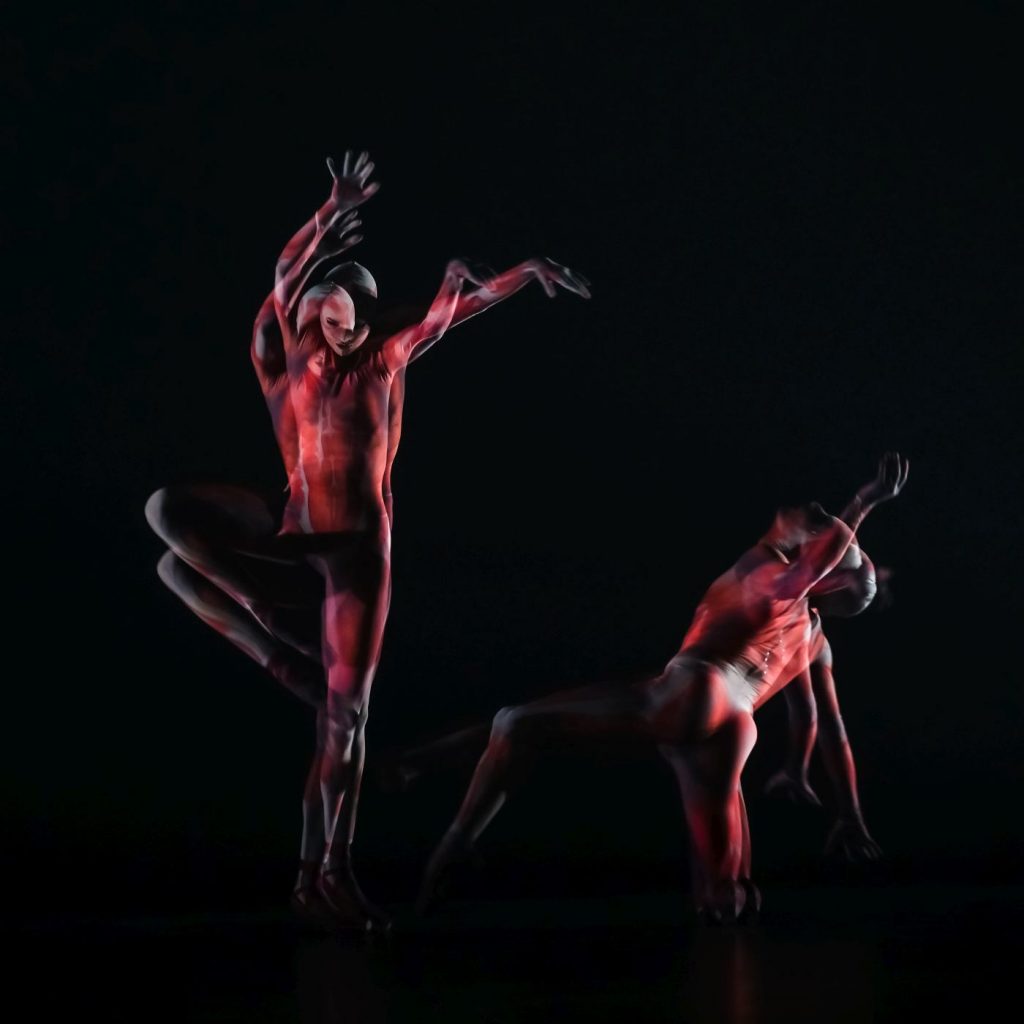
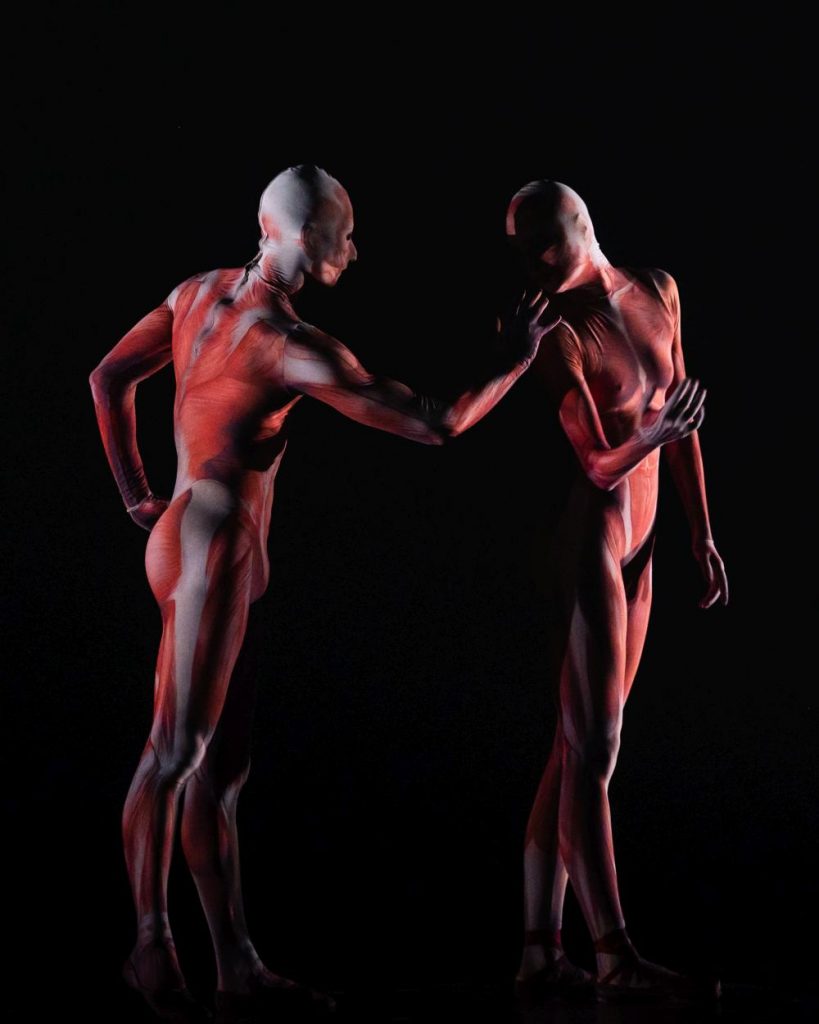 Black fabric tubes pulled over their heads symbolized axons. Their network kept each neuron in place. Suddenly, an unnerving sound unleashed flashing signals that generated spiky movements. Seconds later, the dancers’ limbs lashed mechanically sideways, indicating a cerebral deadlock. Neural degeneration was underway. One after the other, the dancers pulled the axons off their heads and fled, their arms flailing. Ripped from their cell bodies, the axons deteriorated.
Black fabric tubes pulled over their heads symbolized axons. Their network kept each neuron in place. Suddenly, an unnerving sound unleashed flashing signals that generated spiky movements. Seconds later, the dancers’ limbs lashed mechanically sideways, indicating a cerebral deadlock. Neural degeneration was underway. One after the other, the dancers pulled the axons off their heads and fled, their arms flailing. Ripped from their cell bodies, the axons deteriorated.
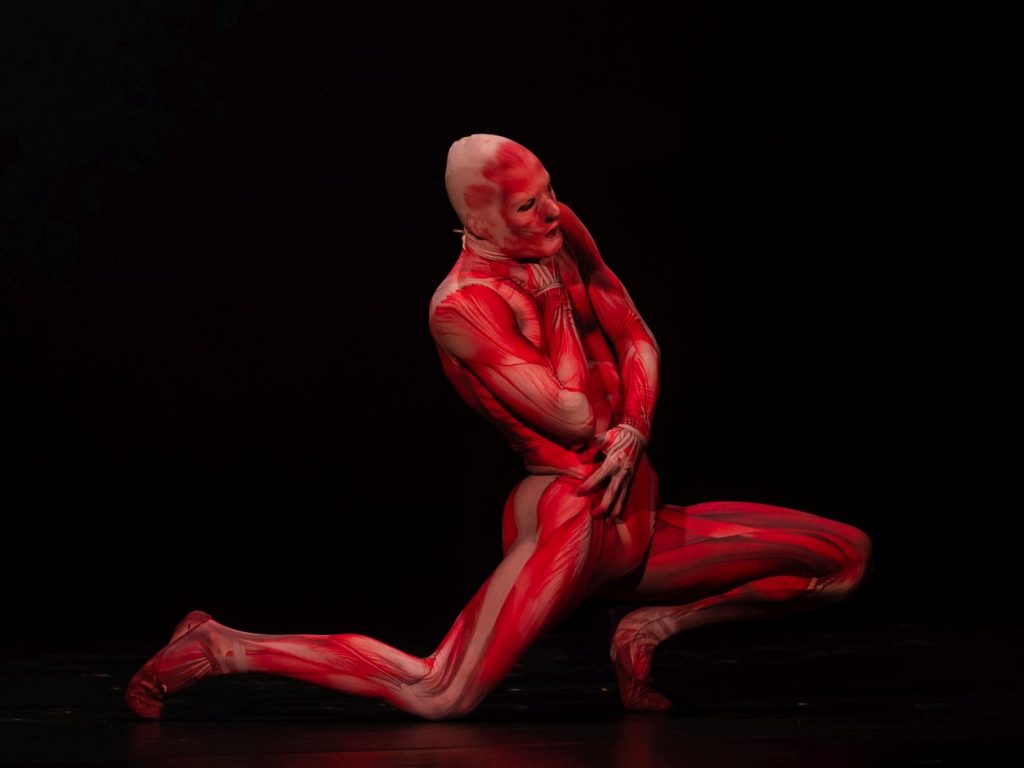
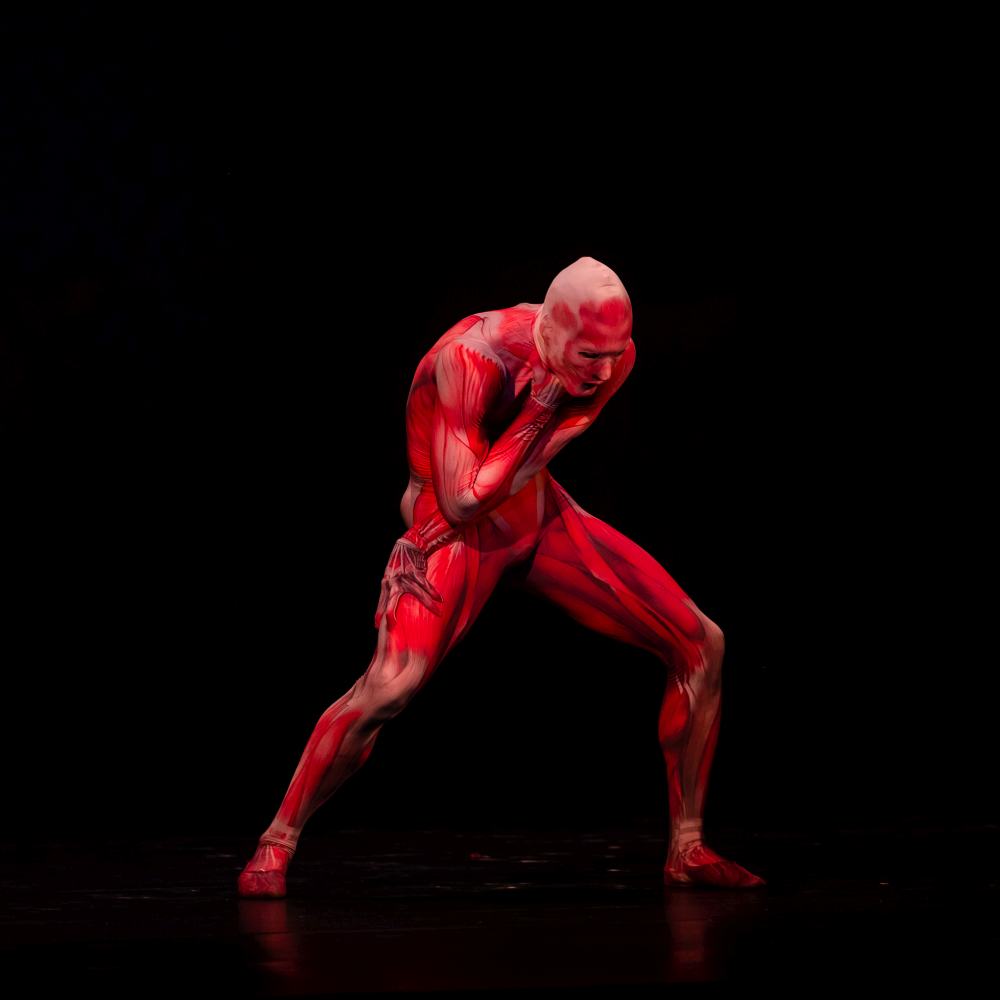 The robot-like man who appeared from the fathomless, black space must have been the one whose nerves we had just witnessed suffering. He was not merely thin-skinned, but skinless up to his bones and muscles. Raw and unprotected, the sheer existence of his body alienated him. The woman who entered the dark stage from the opposite side was similarly exposed and disturbed. When she touched the man’s arm, both pulled back reflexively as if burned. Initially wavering between curiosity and attraction, their encounter quickly turned into a shadowboxing-like attack. Although the woman never touched the man, he crawled on all fours, shirking from her blows and kicks. She had already receded into the distance, but his arms continued to clench his chest.
The robot-like man who appeared from the fathomless, black space must have been the one whose nerves we had just witnessed suffering. He was not merely thin-skinned, but skinless up to his bones and muscles. Raw and unprotected, the sheer existence of his body alienated him. The woman who entered the dark stage from the opposite side was similarly exposed and disturbed. When she touched the man’s arm, both pulled back reflexively as if burned. Initially wavering between curiosity and attraction, their encounter quickly turned into a shadowboxing-like attack. Although the woman never touched the man, he crawled on all fours, shirking from her blows and kicks. She had already receded into the distance, but his arms continued to clench his chest.
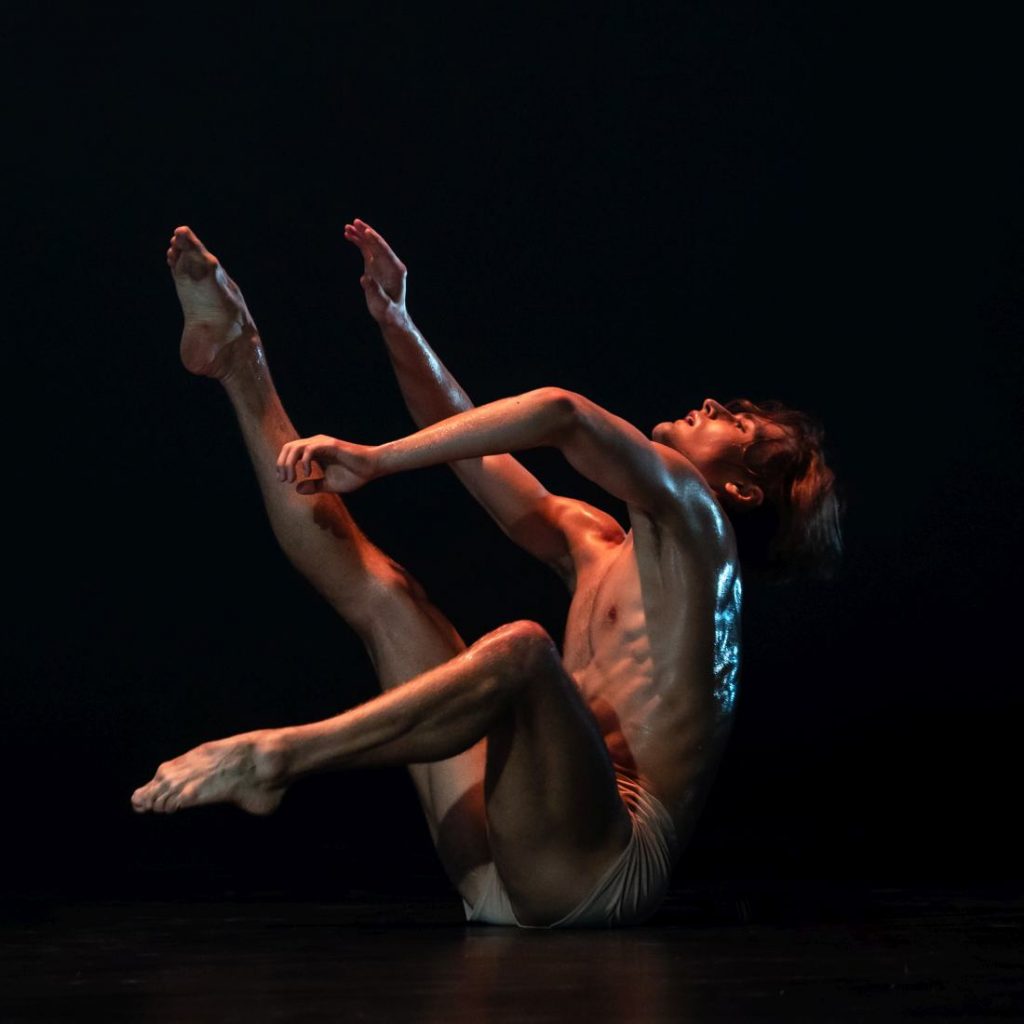
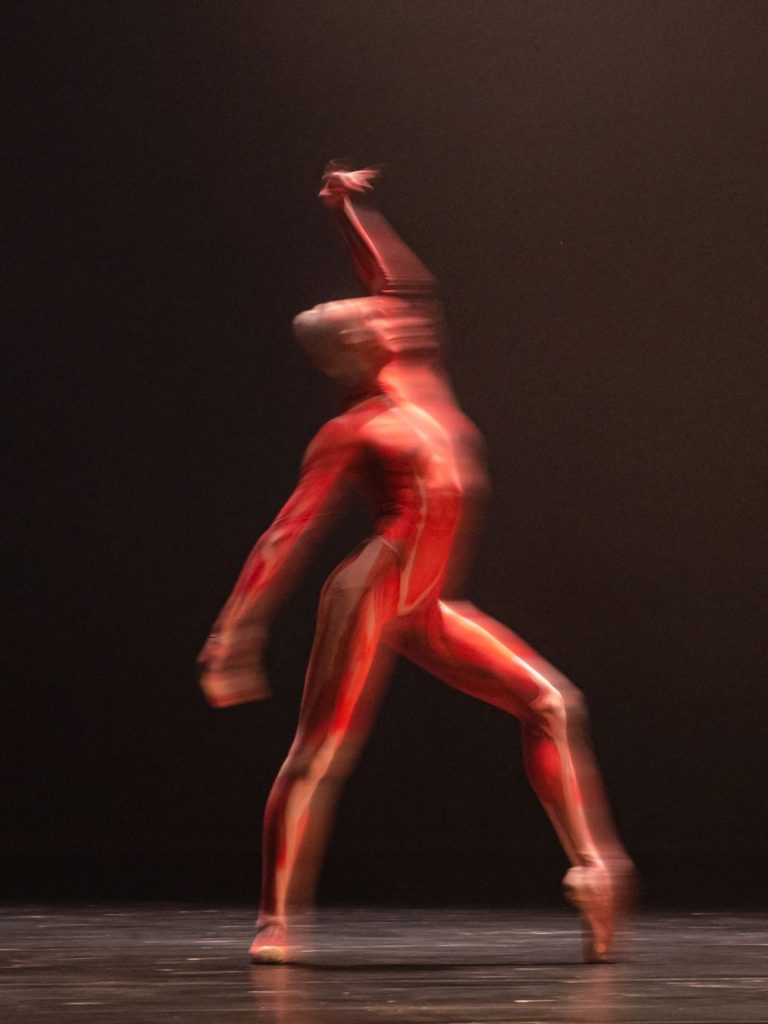 Once he felt safe and recovered to his feet, the black tentacles of a huge polyp appeared on the left side of the backdrop. Perhaps, they represented the level to which the traumatized spirits had declined?
Once he felt safe and recovered to his feet, the black tentacles of a huge polyp appeared on the left side of the backdrop. Perhaps, they represented the level to which the traumatized spirits had declined?
Six people who replaced the maltreated man accomplished the first step of mental restoration. Although still skinless and strutting like spiders, their arms reaching out like tentacles for prey, they had the brains for an acrobatic pas de trois. One man, with legs straddling at the front of the stage and his arms stretched into a V-shape, thrust his chest toward heaven, collapsed, and struggled back onto his feet. His flailing arms and kicking legs seemed to fend off the thickening knot of tentacles on the backdrop. His gaping mouth gave him a helpless look, but he persevered. While he jerked and his hands gripped his neck as if he were choking, the tentacles vanished.
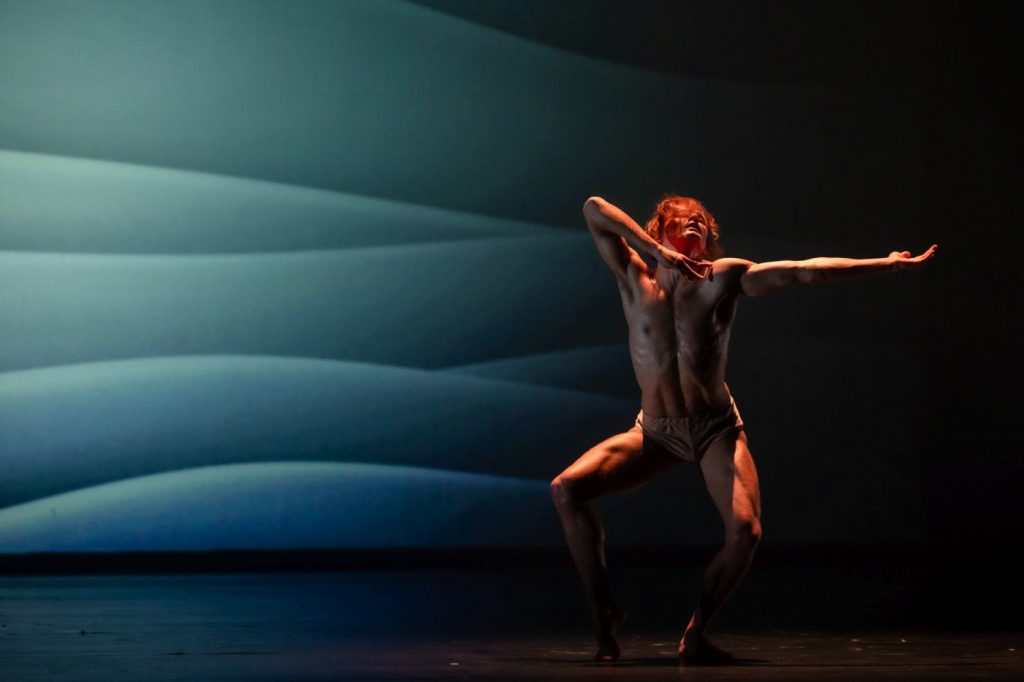
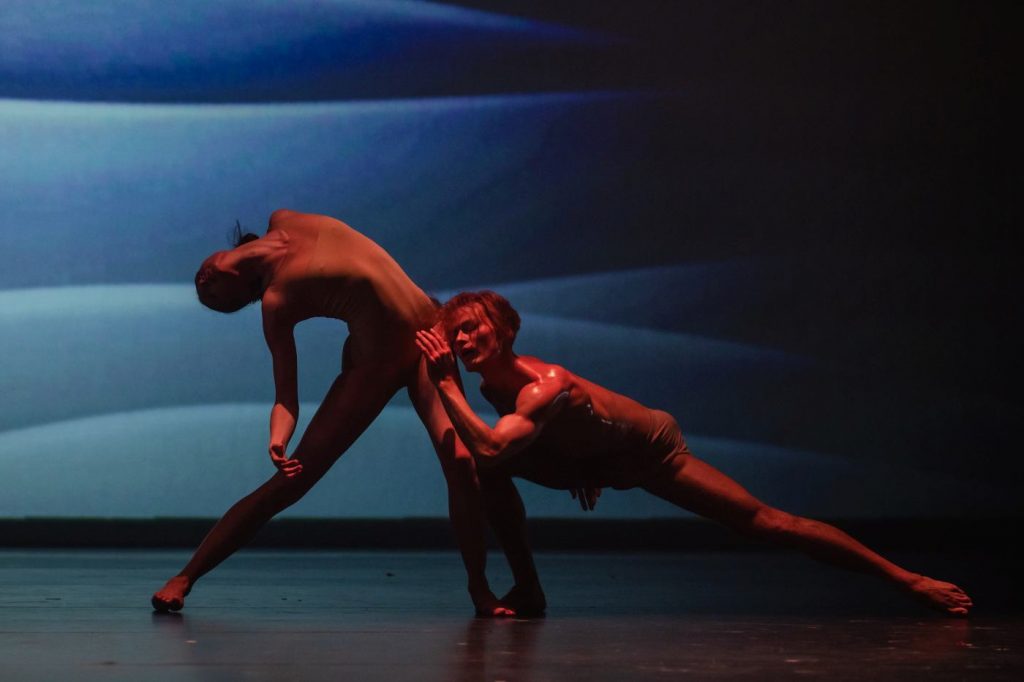 Huge progress was made when he brought the others, who had turned into awkward pillars of salt, into the warm spotlight. Their sense of beauty and togetherness was restored and healing completed when, upon a woman’s solo, a man (Ildar Gainutdinov) slumped on stage like a newborn, his hair tousled and skin wet with oil. His legs buckled under his weight as he attempted to walk, and, while gazing at his arms, he slowly became conscious of himself.
Huge progress was made when he brought the others, who had turned into awkward pillars of salt, into the warm spotlight. Their sense of beauty and togetherness was restored and healing completed when, upon a woman’s solo, a man (Ildar Gainutdinov) slumped on stage like a newborn, his hair tousled and skin wet with oil. His legs buckled under his weight as he attempted to walk, and, while gazing at his arms, he slowly became conscious of himself.
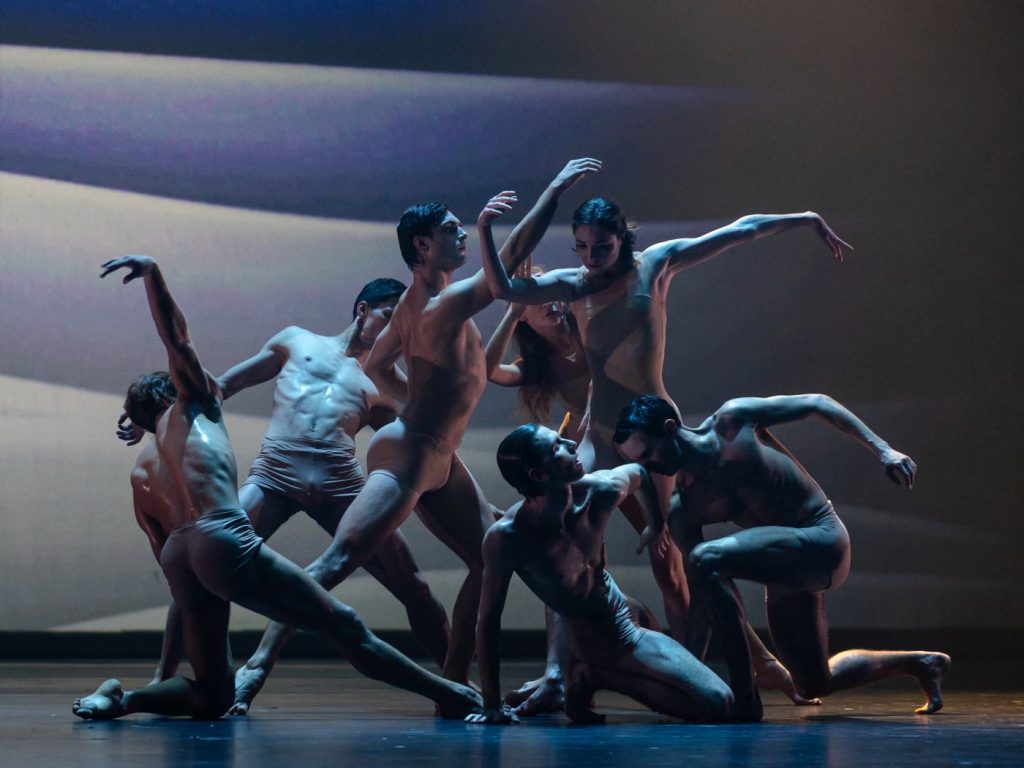
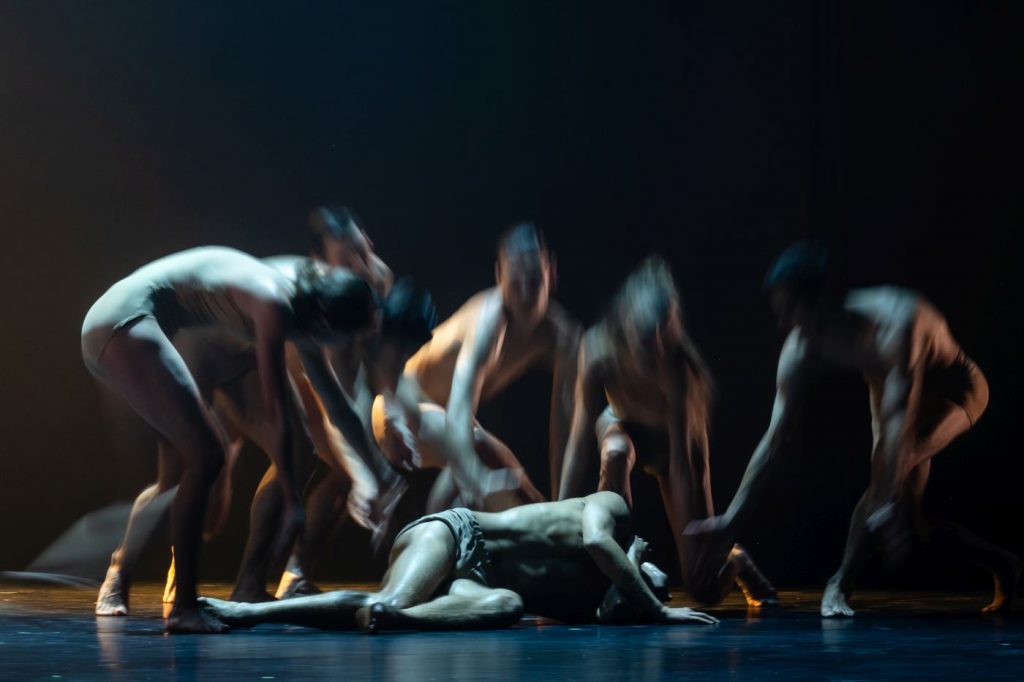 When a woman (Alena Kovaleva) joined him, their movements complemented each other’s like yin and yang. Accompanied by spherical sounds, harmony came to the group. Actions and reactions merged into a gentle flow. Being together and being human was precious. After swimming through invisible waters, which they seemed to pour twice over their heads like a baptismal ritual, their hands rested in front of their necks, flickering from the pulse of life. Just as they assembled around a circle of light, the stage went dark.
When a woman (Alena Kovaleva) joined him, their movements complemented each other’s like yin and yang. Accompanied by spherical sounds, harmony came to the group. Actions and reactions merged into a gentle flow. Being together and being human was precious. After swimming through invisible waters, which they seemed to pour twice over their heads like a baptismal ritual, their hands rested in front of their necks, flickering from the pulse of life. Just as they assembled around a circle of light, the stage went dark.
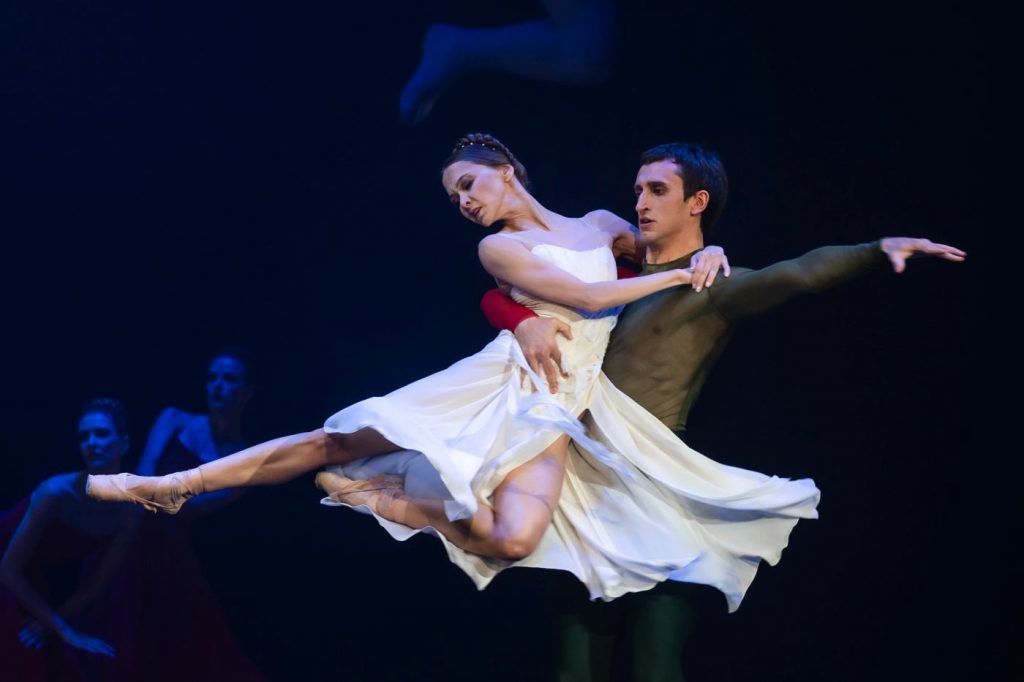
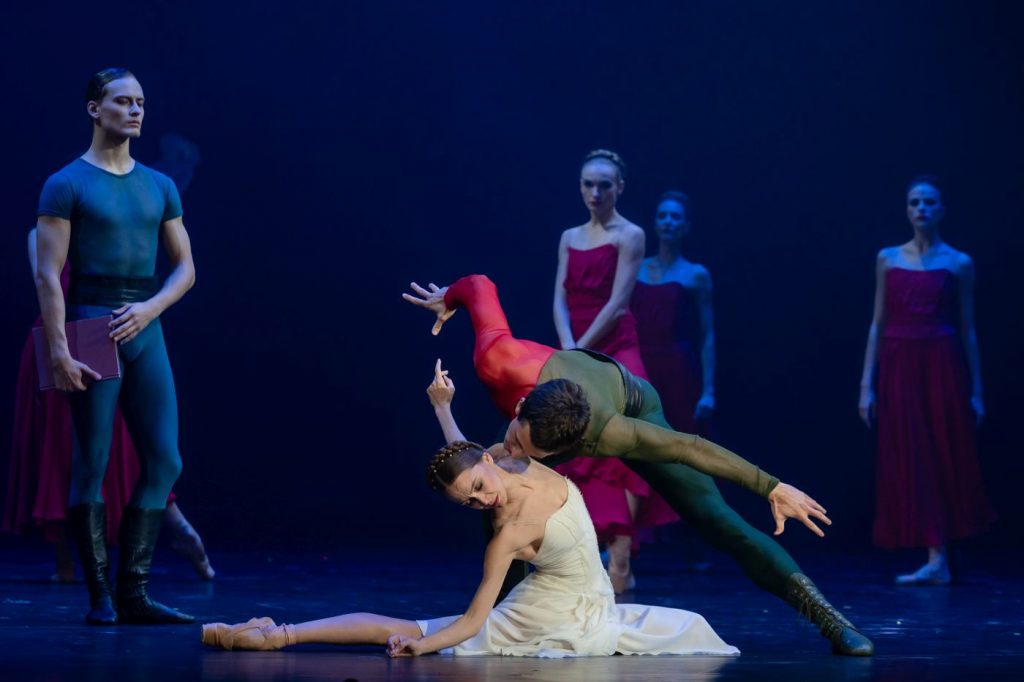 Possokhov’s Francesca da Rimini was created for San Francisco Ballet in 2012 and added to MuzArts’ repertory in 2016. It’s accompaniment, Tchaikovsky’s symphonic poem of the same title, is rich and colorful.
Possokhov’s Francesca da Rimini was created for San Francisco Ballet in 2012 and added to MuzArts’ repertory in 2016. It’s accompaniment, Tchaikovsky’s symphonic poem of the same title, is rich and colorful.
Francesca da Rimini, an Italian noblewoman of Ravenna, had an affair with Paolo Malatesta, the stepbrother of her husband, Giovanni. Upon discovering the adultery, Giovanni murdered both.
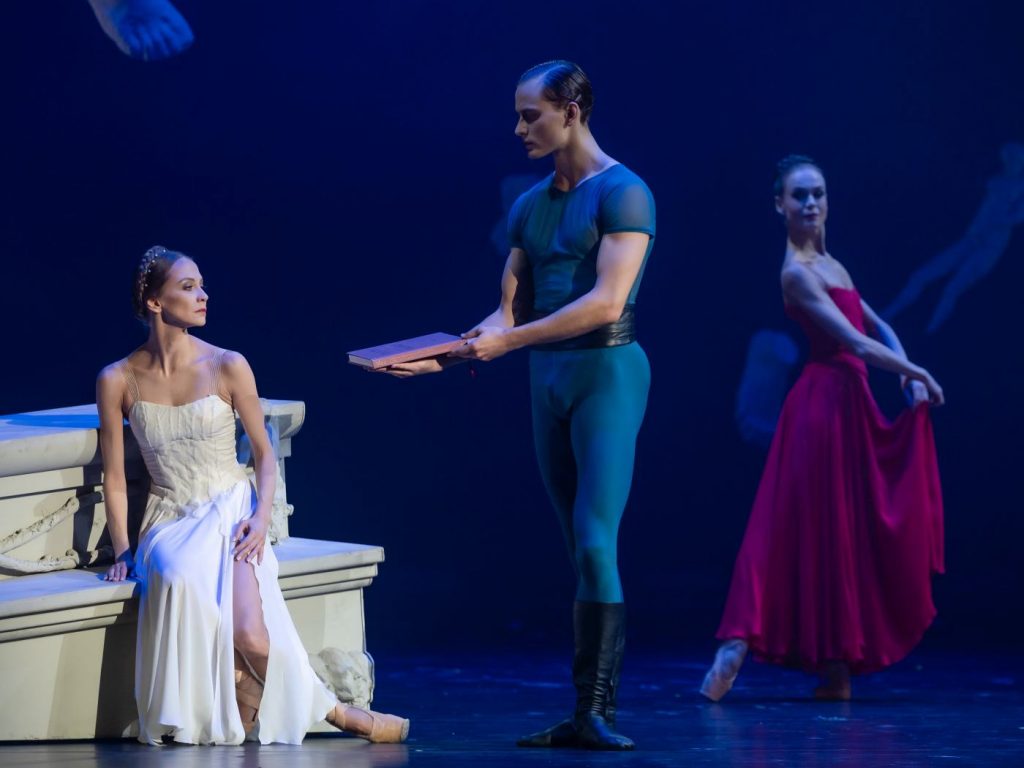
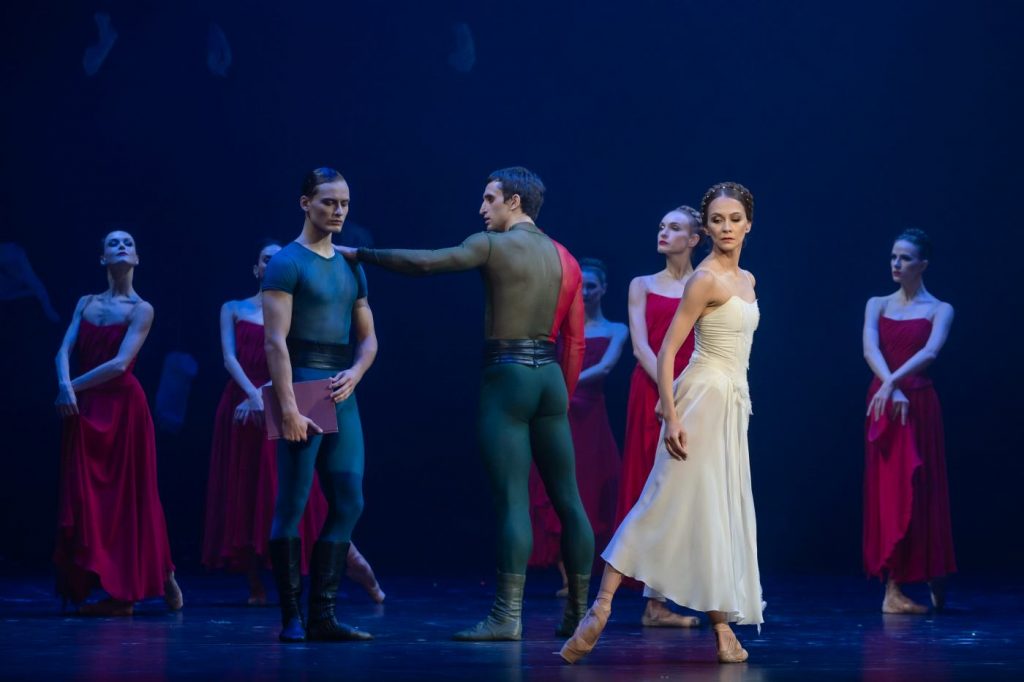 Dante Alighieri, a contemporary of Francesca, included her fate in his Divine Comedy, in which she and Paolo were banished to the second circle of the Inferno reserved for the lustful. There, she explained to Dante that love overpowered her while she was reading a chivalric romance about Lancelot du Lac, “We yielded to our passions because of one single line in that book… A pimp was that book, and a pimp was the one who wrote it.”
Dante Alighieri, a contemporary of Francesca, included her fate in his Divine Comedy, in which she and Paolo were banished to the second circle of the Inferno reserved for the lustful. There, she explained to Dante that love overpowered her while she was reading a chivalric romance about Lancelot du Lac, “We yielded to our passions because of one single line in that book… A pimp was that book, and a pimp was the one who wrote it.”
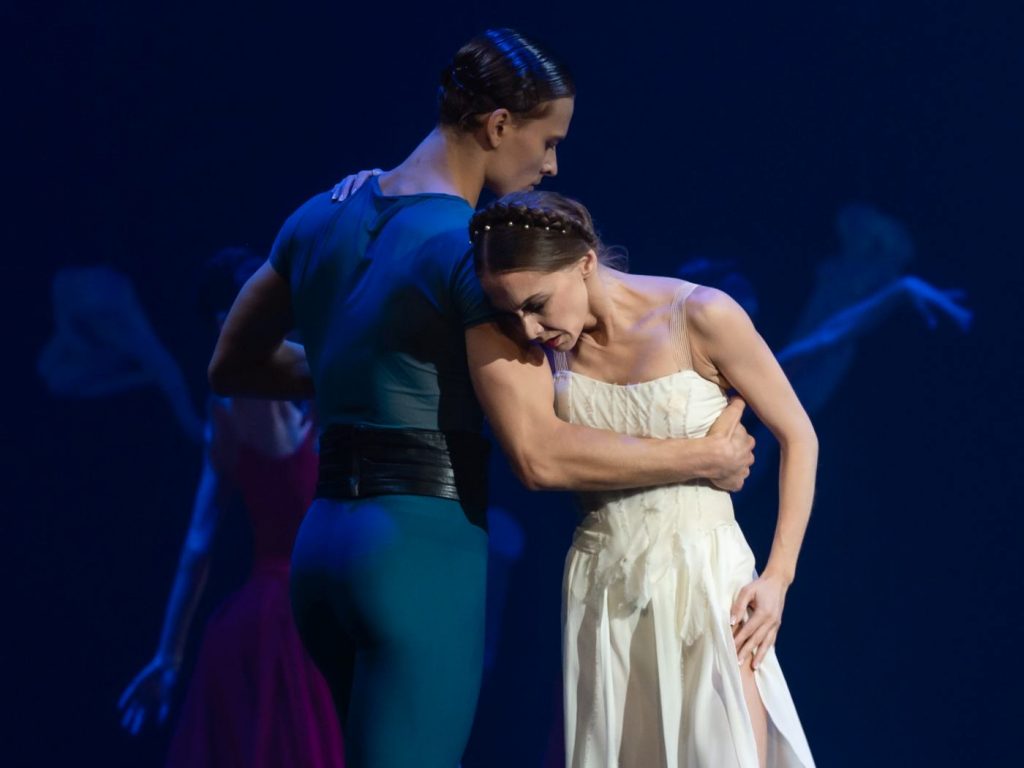
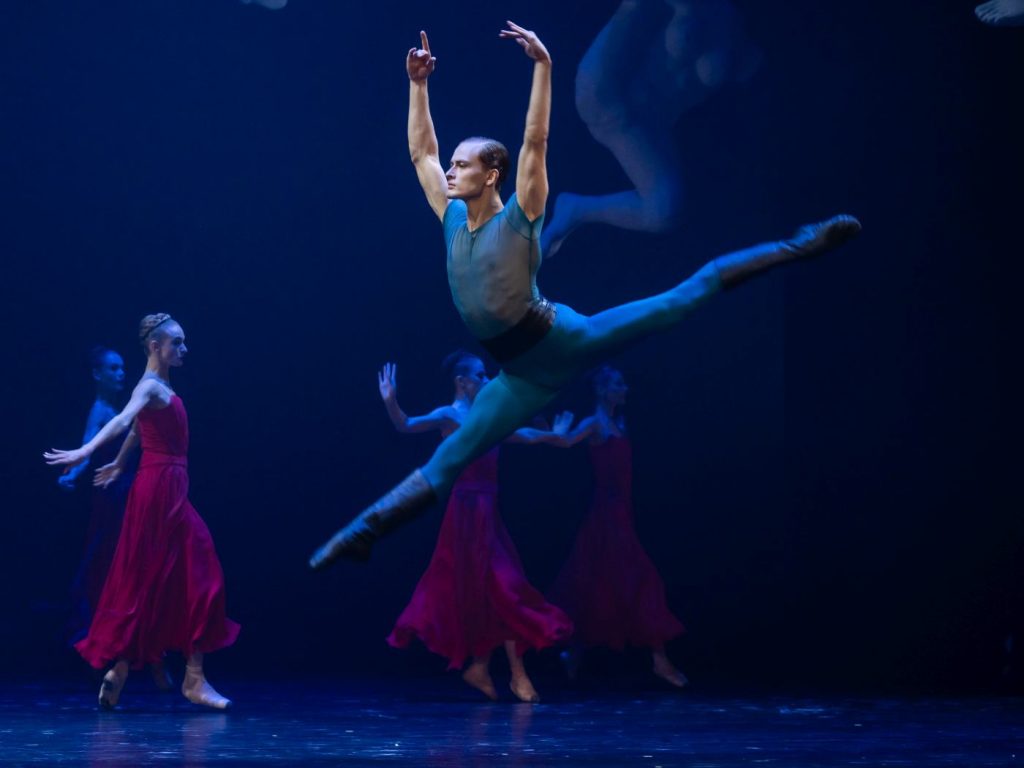 Possokhov’s Francesca (Anastasia Stashkevich), wearing a silky, pristine white dress (costume design by Igor Chapurin), was similarly reading a book—Dante’s Divine Comedy. Next to her on a broken, marble fresco sat Giovanni (Egor Gerashchenko), his half-red, half-olive colored shirt perhaps indicating that he had both loving and hateful sides. In all probability, he would end up in hell as well, but for now, he was part of Francesca’s tormenting memories. Paolo (Ildar Gainutdinov) stood behind them in the semi-darkness, looking away.
Possokhov’s Francesca (Anastasia Stashkevich), wearing a silky, pristine white dress (costume design by Igor Chapurin), was similarly reading a book—Dante’s Divine Comedy. Next to her on a broken, marble fresco sat Giovanni (Egor Gerashchenko), his half-red, half-olive colored shirt perhaps indicating that he had both loving and hateful sides. In all probability, he would end up in hell as well, but for now, he was part of Francesca’s tormenting memories. Paolo (Ildar Gainutdinov) stood behind them in the semi-darkness, looking away.
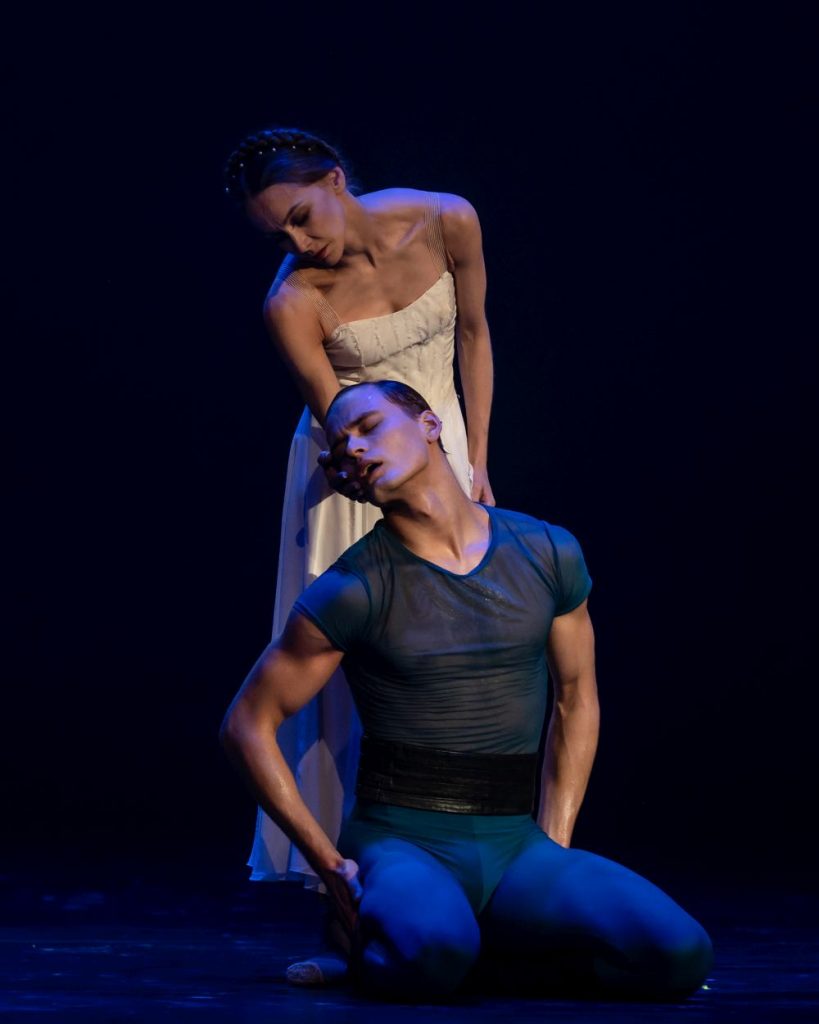
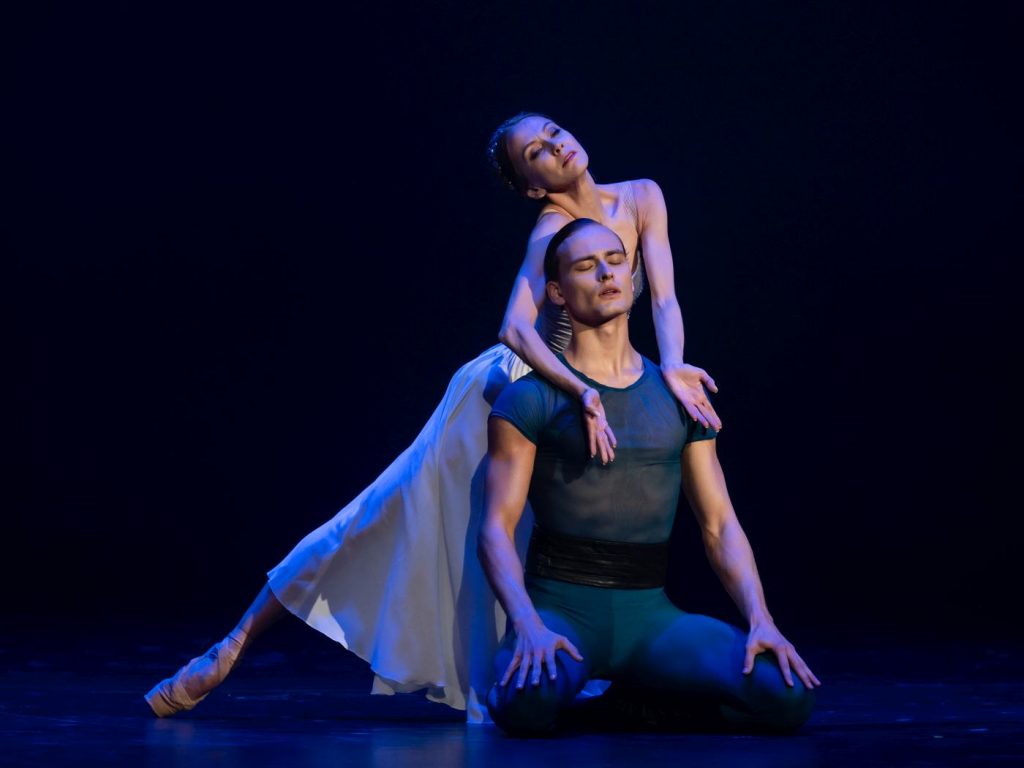
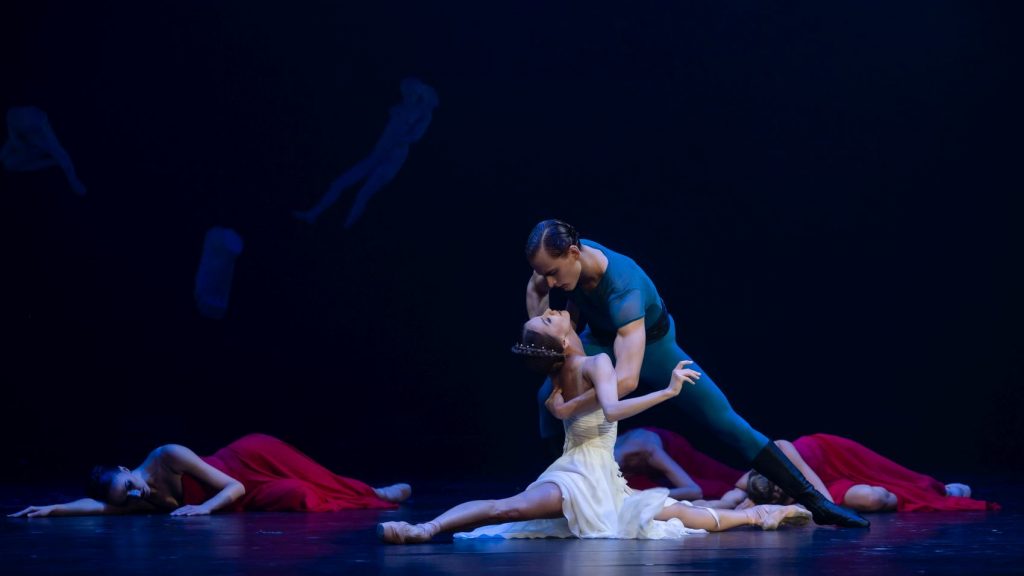 Five court ladies in floor-length, red dresses (Olga Marchenkova, Ekaterina Besedina, Ekaterina Smurova, Anna Zakaraia, and Anna Grigireva) and three guardians of hell (Vasily Danilchuk, Anton Gainutdinov, and Karim Abdullin), their pale white, full-body leotards darkened from soot, joined them in the cavernous, gloomy blue of hell.
Five court ladies in floor-length, red dresses (Olga Marchenkova, Ekaterina Besedina, Ekaterina Smurova, Anna Zakaraia, and Anna Grigireva) and three guardians of hell (Vasily Danilchuk, Anton Gainutdinov, and Karim Abdullin), their pale white, full-body leotards darkened from soot, joined them in the cavernous, gloomy blue of hell.
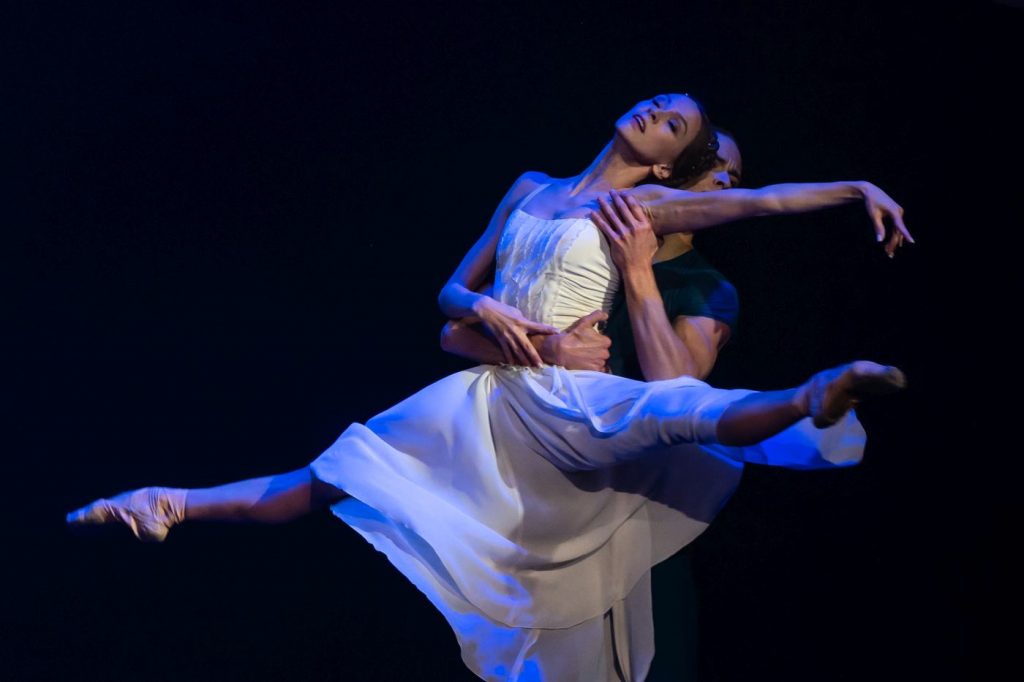
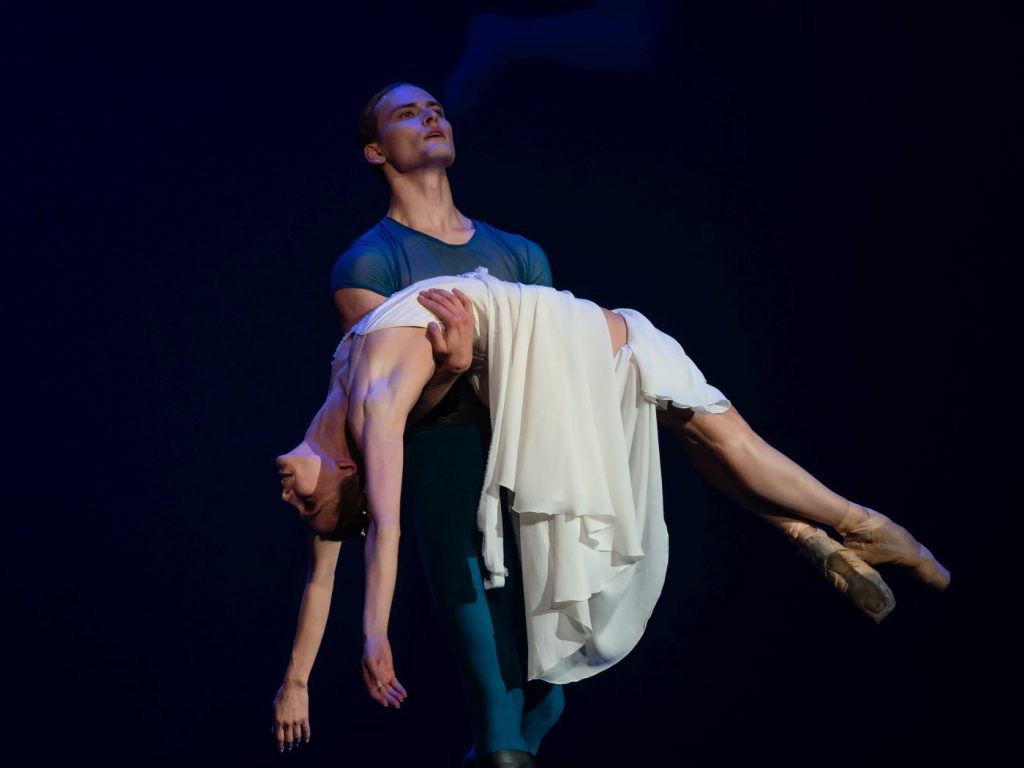 From all sides, fragments of marble statues (among them amorous couples) protruded into the foggy air like remnants of a shattered past (set design by Maria Treguba). The relationship between Francesca and Giovanni wasn’t yet shattered but was bloodless and one-sided. Giovanni was staid and earnestly loving, whereas the sensitive Francesca seemed to live in a dream world. Although her eyes avoided Giovanni at all times and she disliked his kiss on her neck, he was her anchor.
From all sides, fragments of marble statues (among them amorous couples) protruded into the foggy air like remnants of a shattered past (set design by Maria Treguba). The relationship between Francesca and Giovanni wasn’t yet shattered but was bloodless and one-sided. Giovanni was staid and earnestly loving, whereas the sensitive Francesca seemed to live in a dream world. Although her eyes avoided Giovanni at all times and she disliked his kiss on her neck, he was her anchor.
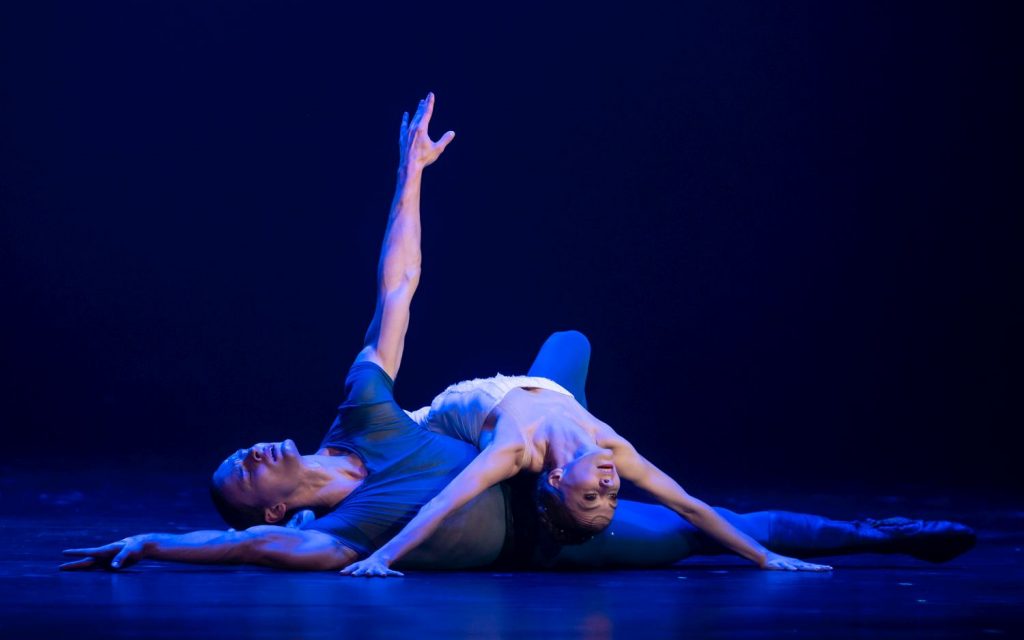
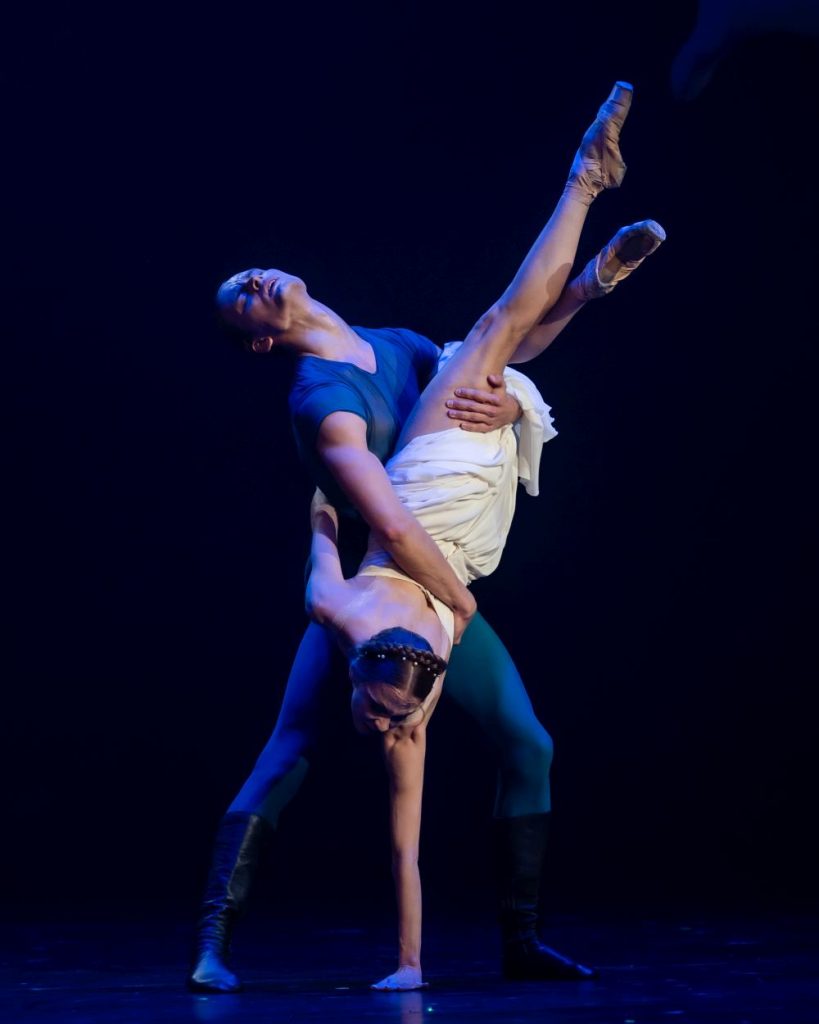
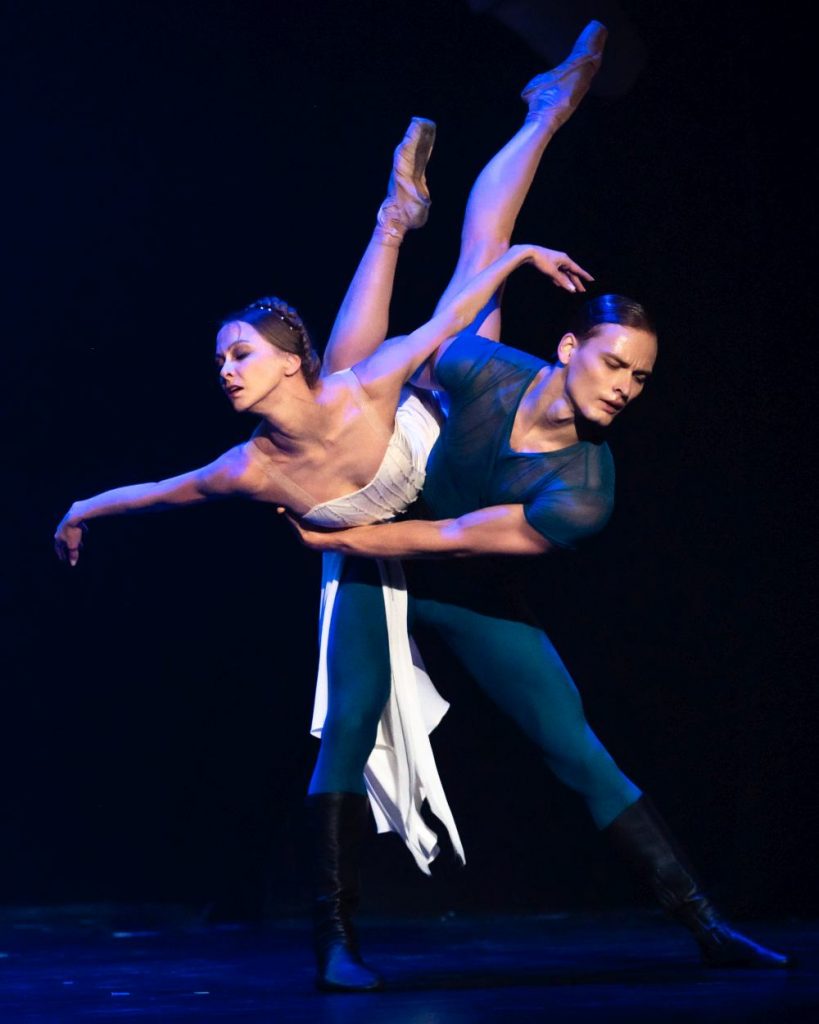 Before leaving the scene, Giovanni put a protective hand on his wife’s head and a brotherly one on Paolo’s shoulder, but, abruptly turning around and glancing at Paolo, he must have apprehended what was to come. With Giovanni gone, the court ladies whispered when Paolo approached Francesca. They mimicked her attempts to resist his advances or crossed the stage with quick steps, stirring the air with flurries of port de bras. Often, their crossed-over hands held their skirts chastely folded or, sitting on the floor, their crossed legs shielded their loins. The moment Francesca fell for Paolo, the ladies sank to the feet of the guardians of hell.
Before leaving the scene, Giovanni put a protective hand on his wife’s head and a brotherly one on Paolo’s shoulder, but, abruptly turning around and glancing at Paolo, he must have apprehended what was to come. With Giovanni gone, the court ladies whispered when Paolo approached Francesca. They mimicked her attempts to resist his advances or crossed the stage with quick steps, stirring the air with flurries of port de bras. Often, their crossed-over hands held their skirts chastely folded or, sitting on the floor, their crossed legs shielded their loins. The moment Francesca fell for Paolo, the ladies sank to the feet of the guardians of hell.
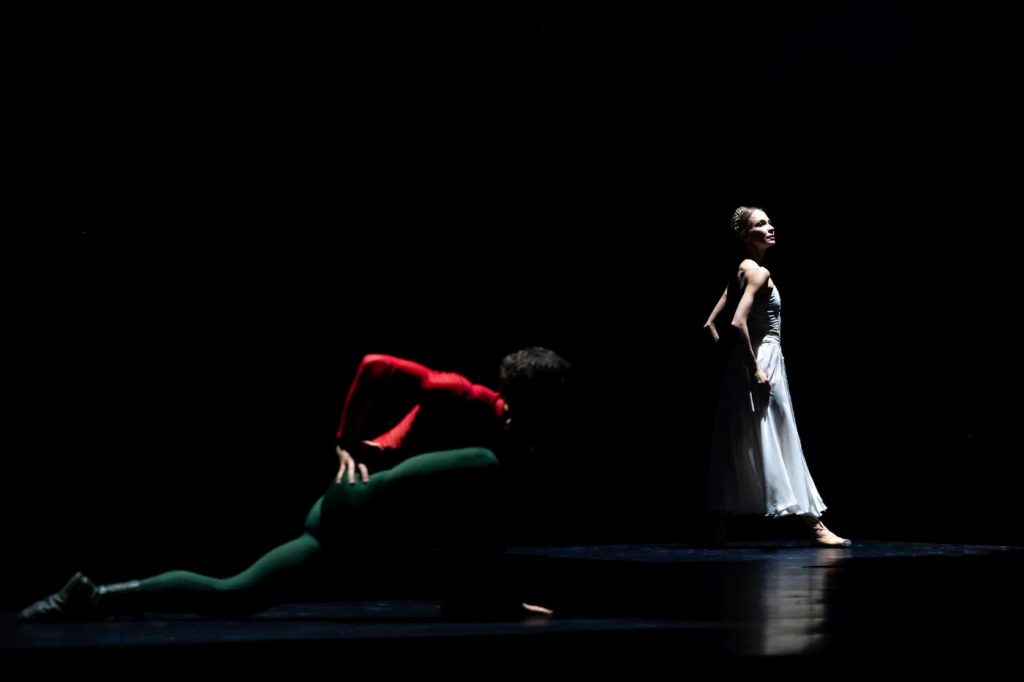
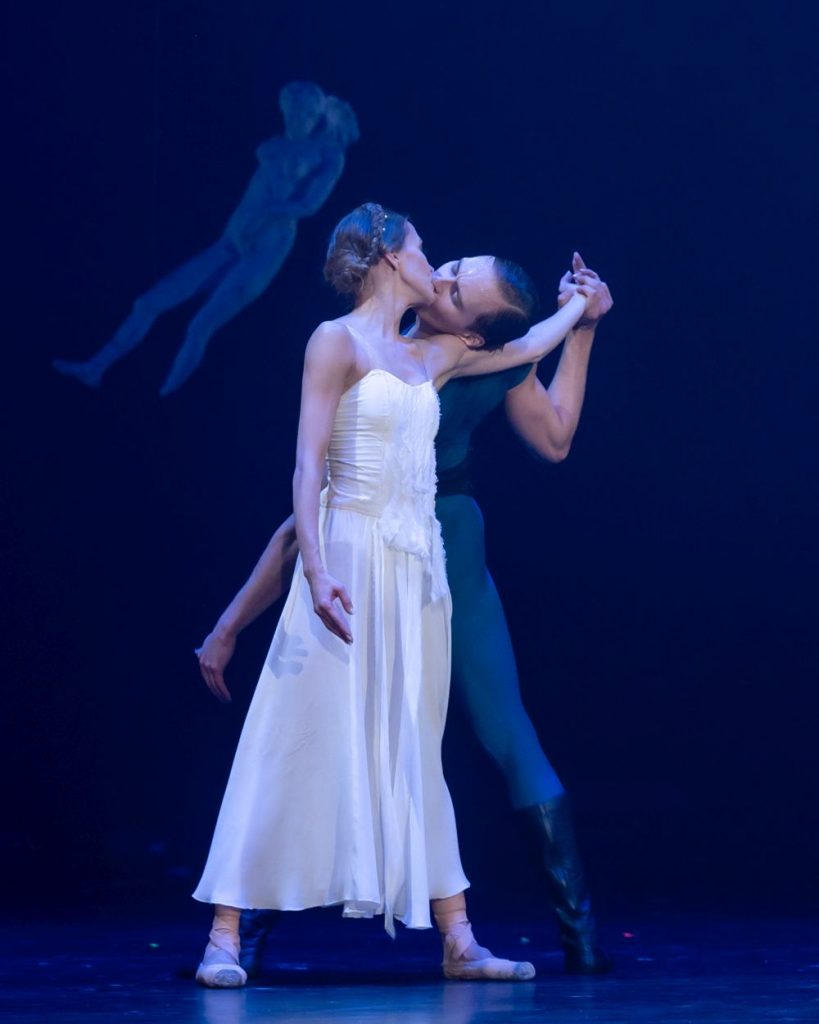
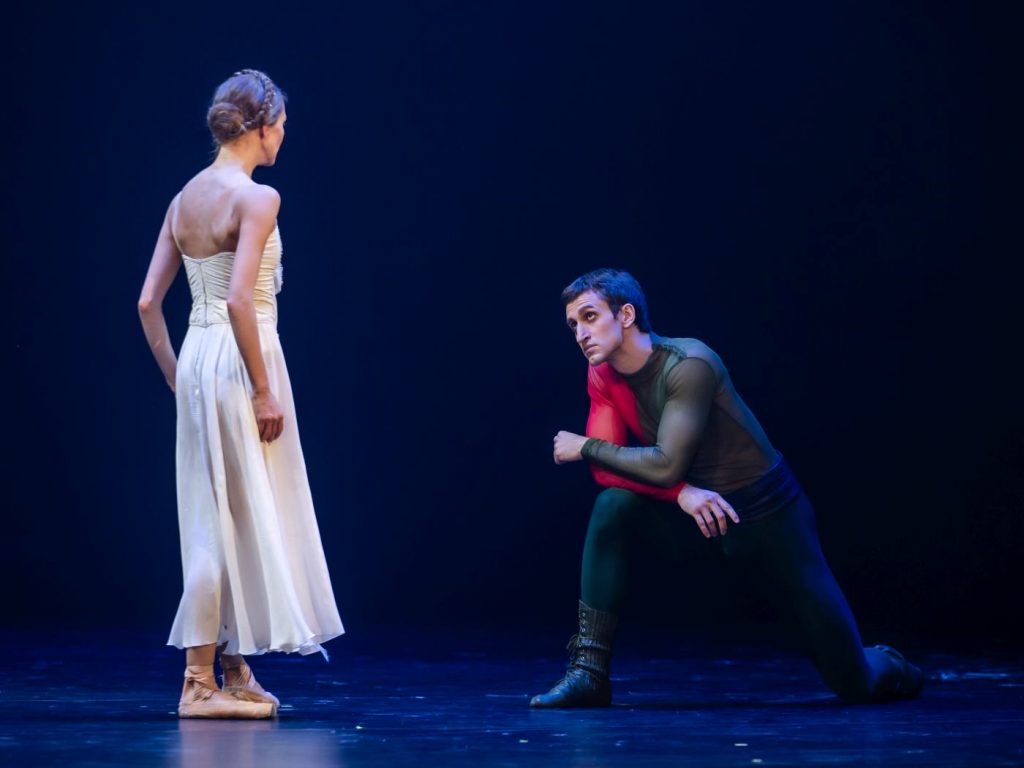 Paolo rotated around Francesca like a windmill, directing his hasty, passionate jumps at her. Bypassing his outstretched arms was impossible. She tried to run away but then stopped helplessly and gave in. As he carried her erect body, she stretched her arms sideways like the crucified Christ, then she collapsed over his shoulder, emptied of all strength. Abhorred by the lovers’ kiss, the ladies shielded their eyes behind their elbows. Only when Francesca bowed her head submissively to them did the arrogant, contemptuous lot back out.
Paolo rotated around Francesca like a windmill, directing his hasty, passionate jumps at her. Bypassing his outstretched arms was impossible. She tried to run away but then stopped helplessly and gave in. As he carried her erect body, she stretched her arms sideways like the crucified Christ, then she collapsed over his shoulder, emptied of all strength. Abhorred by the lovers’ kiss, the ladies shielded their eyes behind their elbows. Only when Francesca bowed her head submissively to them did the arrogant, contemptuous lot back out.
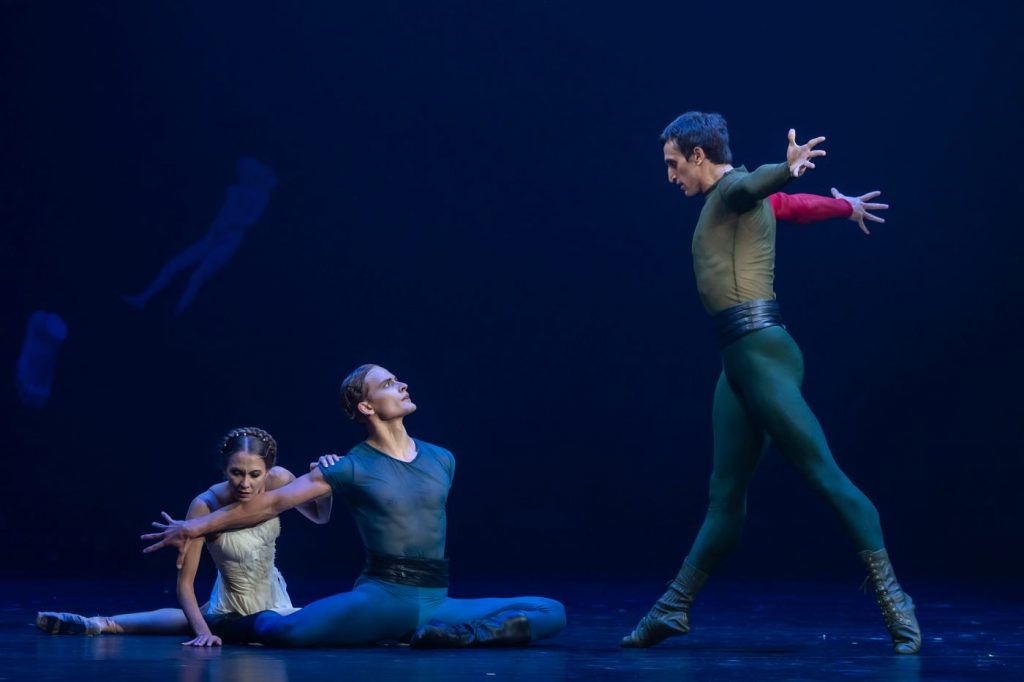
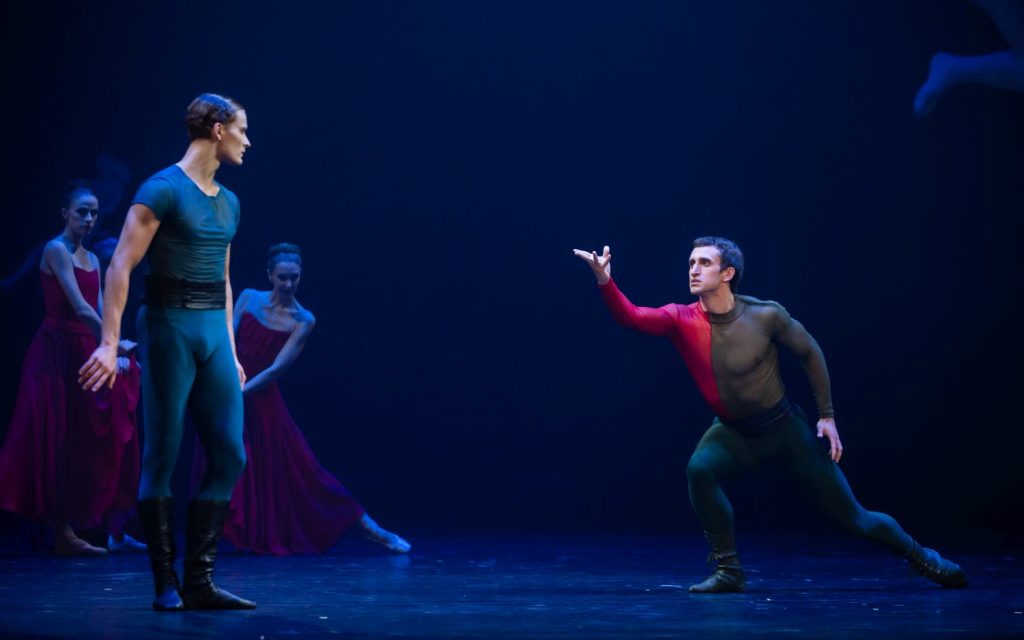 The following scene portrayed the love triangle and the disloyal court as a sober chess game, shedding light only on those few squares where action took place. The second Paolo stepped onto Francesca’s square, the two found themselves back in hell. Portentous brass sounds heralded Giovanni’s return. He rolled in like a thunderbolt, propelling himself high and landing in a deep lunge, from where his disbelieving yet furious gaze caught Francesca and Paolo in an intimate embrace. Paolo’s head hung guiltily as Giovanni leapt toward him, his outstretched arm asking why. Mad with anger, Giovanni jumped toward the lovers twice. The invisible dagger in his hand first killed Francesca, then Paolo. Still raging with ire, Giovanni stepped over the corpses, scornfully kicking them. Then the three guardians of hell put a robust noose over his head and, pulling him away by the rope, ensured that guilt would strangle him forever.
The following scene portrayed the love triangle and the disloyal court as a sober chess game, shedding light only on those few squares where action took place. The second Paolo stepped onto Francesca’s square, the two found themselves back in hell. Portentous brass sounds heralded Giovanni’s return. He rolled in like a thunderbolt, propelling himself high and landing in a deep lunge, from where his disbelieving yet furious gaze caught Francesca and Paolo in an intimate embrace. Paolo’s head hung guiltily as Giovanni leapt toward him, his outstretched arm asking why. Mad with anger, Giovanni jumped toward the lovers twice. The invisible dagger in his hand first killed Francesca, then Paolo. Still raging with ire, Giovanni stepped over the corpses, scornfully kicking them. Then the three guardians of hell put a robust noose over his head and, pulling him away by the rope, ensured that guilt would strangle him forever.
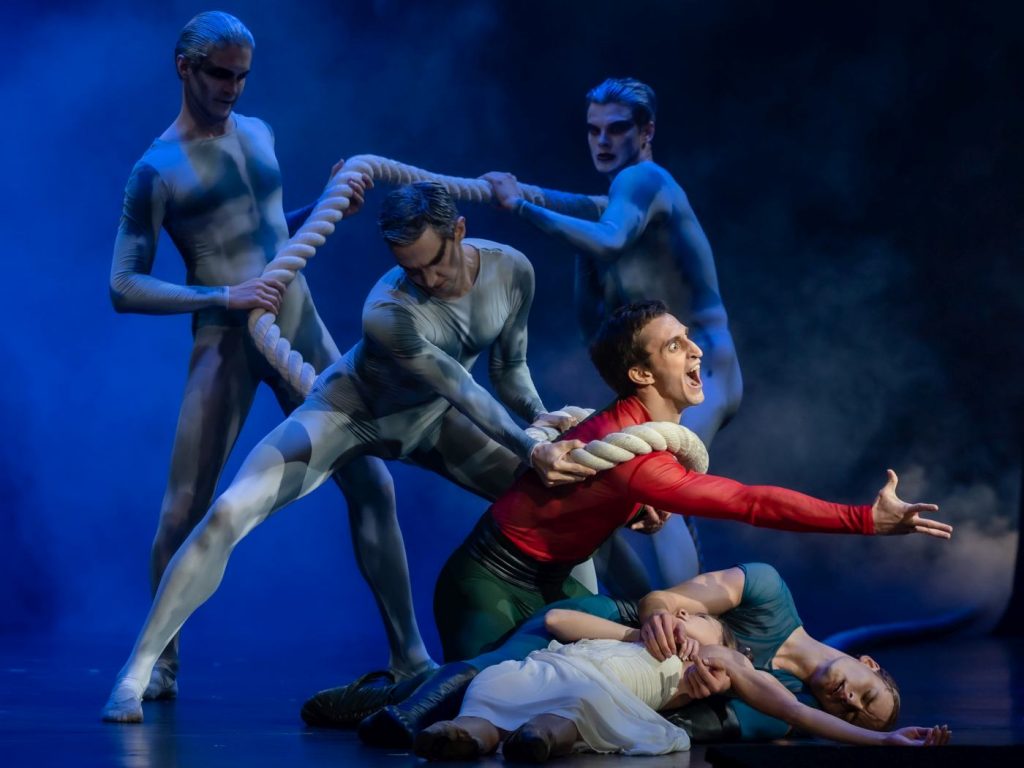
| Links: | Website of the Maly Theatre | |
| Trailer Planida | ||
| Photos: | 1. | Alexei Putintsev (Yegor Dryomov), “Russian Character” by Pavel Glukhov, MuzArts 2026 |
| 2. | Alexei Putintsev (Yegor Dryomov), “Russian Character” by Pavel Glukhov, MuzArts 2026 | |
| 3. | Elizaveta Kokoreva (Katya Malysheva), Ekaterina Krysanova (Maria Polikarpovna), Alexei Putintsev (Yegor Dryomov), and Mikhail Lobukhin (Yegor Egorovich); “Russian Character” by Pavel Glukhov, MuzArts 2026 | |
| 4. | Georgy Gusev (Yegor`s comrade), Alexei Putintsev (Yegor Dryomov), and Pavel Sorokin (Yegor’s comrade); “Russian Character” by Pavel Glukhov, MuzArts 2026 | |
| 5. | Georgy Gusev (Yegor`s comrade) and Alexei Putintsev (Yegor Dryomov), “Russian Character” by Pavel Glukhov, MuzArts 2026 | |
| 6. | Ensemble, “Russian Character” by Pavel Glukhov, MuzArts 2026 | |
| 7. | Georgy Gusev (Yegor`s comrade), Alexei Putintsev (Yegor Dryomov), and Pavel Sorokin (Yegor’s comrade); “Russian Character” by Pavel Glukhov, MuzArts 2026 | |
| 8. | Pavel Sorokin (Yegor’s comrade), “Russian Character” by Pavel Glukhov, MuzArts 2026 |
|
| 9. | Ekaterina Krysanova (Maria Polikarpovna) and Alexei Putintsev (Yegor Dryomov), “Russian Character” by Pavel Glukhov, MuzArts 2026 | |
| 10. | Ekaterina Krysanova (Maria Polikarpovna) and Mikhail Lobukhin (Yegor Egorovich), “Russian Character” by Pavel Glukhov, MuzArts 2026 | |
| 11. | Ekaterina Krysanova (Maria Polikarpovna) and Mikhail Lobukhin (Yegor Egorovich), “Russian Character” by Pavel Glukhov, MuzArts 2026 | |
| 12. | Alexei Putintsev (Yegor Dryomov) and Ekaterina Krysanova (Maria Polikarpovna), “Russian Character” by Pavel Glukhov, MuzArts 2026 | |
| 13. | Alexei Putintsev (Yegor Dryomov) and Ekaterina Krysanova (Maria Polikarpovna), “Russian Character” by Pavel Glukhov, MuzArts 2026 | |
| 14. | Alexei Putintsev (Yegor Dryomov) and Ekaterina Krysanova (Maria Polikarpovna), “Russian Character” by Pavel Glukhov, MuzArts 2026 | |
| 15. | Mikhail Lobukhin (Yegor Egorovich) and Alexei Putintsev (Yegor Dryomov), “Russian Character” by Pavel Glukhov, MuzArts 2026 | |
| 16. | Alexei Putintsev (Yegor Dryomov), Elizaveta Kokoreva (Katya Malysheva), Georgy Gusev (Yegor`s comrade), and Pavel Sorokin (Yegor’s comrade); “Russian Character” by Pavel Glukhov, MuzArts 2026 | |
| 17. | Alexei Putintsev (Yegor Dryomov) and ensemble, “Russian Character” by Pavel Glukhov, MuzArts 2026 | |
| 18. | Alexei Putintsev (Yegor Dryomov) and ensemble, “Russian Character” by Pavel Glukhov, MuzArts 2026 | |
| 19. | Ensemble, “Nerve” by Anna Shchekleina, MuzArts 2026 | |
| 20. | “Nerve” by Anna Shchekleina, MuzArts 2026 | |
| 21. | “Nerve” by Anna Shchekleina, MuzArts 2026 | |
| 22. | “Nerve” by Anna Shchekleina, MuzArts 2026 | |
| 23. | “Nerve” by Anna Shchekleina, MuzArts 2026 | |
| 24. | “Nerve” by Anna Shchekleina, MuzArts 2026 | |
| 25. | “Nerve” by Anna Shchekleina, MuzArts 2026 | |
| 26. | “Nerve” by Anna Shchekleina, MuzArts 2026 | |
| 27. | “Nerve” by Anna Shchekleina, MuzArts 2026 | |
| 28. | Ildar Gainutdinov, “Nerve” by Anna Shchekleina, MuzArts 2026 | |
| 29. | Ildar Gainutdinov, “Nerve” by Anna Shchekleina, MuzArts 2026 | |
| 30. | Alena Kovaleva and Ildar Gainutdinov, “Nerve” by Anna Shchekleina, MuzArts 2026 |
|
| 31. | Ensemble, “Nerve” by Anna Shchekleina, MuzArts 2026 | |
| 32 | Ensemble, “Nerve” by Anna Shchekleina, MuzArts 2026 | |
| 33 | Anastasia Stashkevich (Francesca) and Egor Gerashchenko (Giovanni), “Francesca da Rimini” by Yuri Possokhov, MuzArts 2026 | |
| 34. | Ildar Gainutdinov (Paolo), Anastasia Stashkevich (Francesca), Egor Gerashchenko (Giovanni), and ensemble; “Francesca da Rimini” by Yuri Possokhov, MuzArts 2026 | |
| 35. | Ildar Gainutdinov (Paolo), Egor Gerashchenko (Giovanni), Anastasia Stashkevich (Francesca), and ensemble; “Francesca da Rimini” by Yuri Possokhov, MuzArts 2026 | |
| 36. | Anastasia Stashkevich (Francesca), Ildar Gainutdinov (Paolo), and ensemble; “Francesca da Rimini” by Yuri Possokhov, MuzArts 2026 | |
| 37. | Ildar Gainutdinov (Paolo) and Anastasia Stashkevich (Francesca), “Francesca da Rimini” by Yuri Possokhov, MuzArts 2026 | |
| 38. | Ildar Gainutdinov (Paolo) and ensemble, “Francesca da Rimini” by Yuri Possokhov, MuzArts 2026 |
|
| 39. | Anastasia Stashkevich (Francesca), Ildar Gainutdinov (Paolo), and ensemble; “Francesca da Rimini” by Yuri Possokhov, MuzArts 2026 | |
| 40. | Ildar Gainutdinov (Paolo) and Anastasia Stashkevich (Francesca), “Francesca da Rimini” by Yuri Possokhov, MuzArts 2026 | |
| 41. | Ildar Gainutdinov (Paolo) and Anastasia Stashkevich (Francesca), “Francesca da Rimini” by Yuri Possokhov, MuzArts 2026 | |
| 42 | Anastasia Stashkevich (Francesca) and Ildar Gainutdinov (Paolo), “Francesca da Rimini” by Yuri Possokhov, MuzArts 2026 | |
| 43. | Anastasia Stashkevich (Francesca) and Ildar Gainutdinov (Paolo), “Francesca da Rimini” by Yuri Possokhov, MuzArts 2026 | |
| 44. | Anastasia Stashkevich (Francesca) and Ildar Gainutdinov (Paolo), “Francesca da Rimini” by Yuri Possokhov, MuzArts 2026 |
|
| 45. | Anastasia Stashkevich (Francesca) and Ildar Gainutdinov (Paolo), “Francesca da Rimini” by Yuri Possokhov, MuzArts 2026 | |
| 46. | Anastasia Stashkevich (Francesca) and Ildar Gainutdinov (Paolo), “Francesca da Rimini” by Yuri Possokhov, MuzArts 2026 | |
| 47. | Egor Gerashchenko (Giovanni) and Anastasia Stashkevich (Francesca), “Francesca da Rimini” by Yuri Possokhov, MuzArts 2026 | |
| 48. | Anastasia Stashkevich (Francesca) and Ildar Gainutdinov (Paolo), “Francesca da Rimini” by Yuri Possokhov, MuzArts 2026 | |
| 49. | Anastasia Stashkevich (Francesca) and Egor Gerashchenko (Giovanni), “Francesca da Rimini” by Yuri Possokhov, MuzArts 2026 | |
| 50. | Ildar Gainutdinov (Paolo), Egor Gerashchenko (Giovanni), and ensemble; “Francesca da Rimini” by Yuri Possokhov, MuzArts 2026 | |
| 51. | Anastasia Stashkevich (Francesca), Ildar Gainutdinov (Paolo), and Egor Gerashchenko (Giovanni); “Francesca da Rimini” by Yuri Possokhov, MuzArts 2026 | |
| 52. | Egor Gerashchenko (Giovanni), Ildar Gainutdinov (Paolo), Anastasia Stashkevich (Francesca), Vasily Danilchuk, Anton Gainutdinov, and Karim Abdullin (Guardians of Hell); “Francesca da Rimini” by Yuri Possokhov, MuzArts 2026 |
|
| all photos © MuzArts/Batyr Annadurdiev | ||
| Editing: | Kayla Kauffman |


